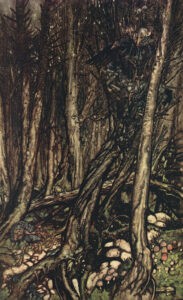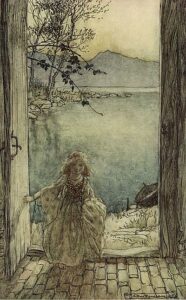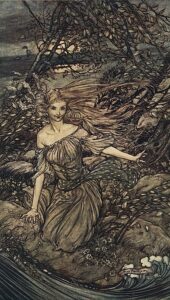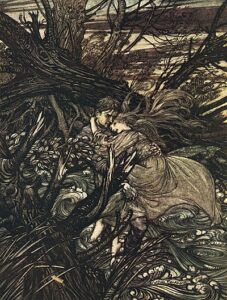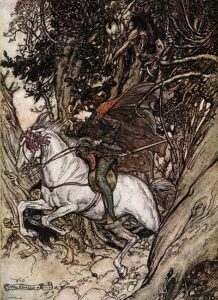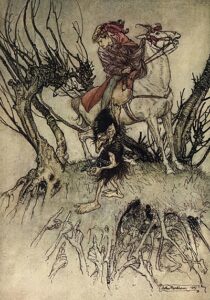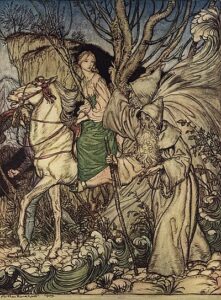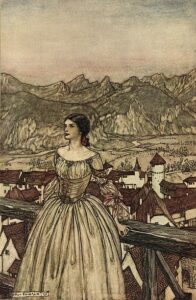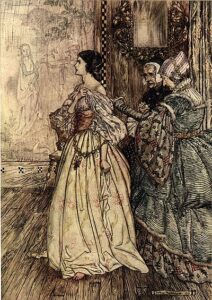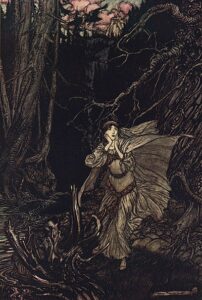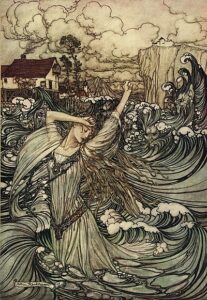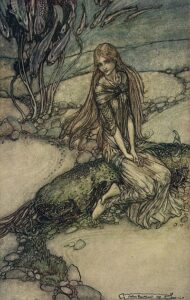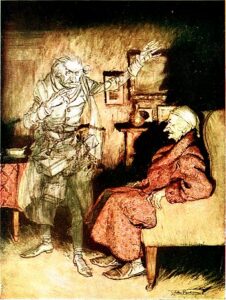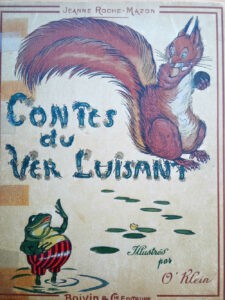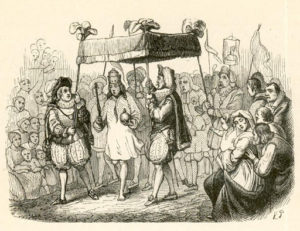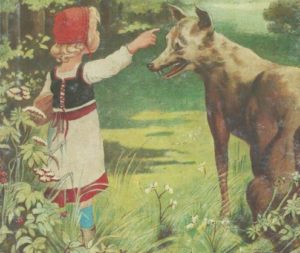
Undine
LIRE
ONDINE
I – THE ARRIVAL OF THE KNIGHT
Once upon a time there was an old fisherman who lived in a wonderful land. The point of land, covered with flowering grass, where his cottage stood, extended far out into the middle of the waters of a great lake, and the blue waves caressed this ground shaded by beautiful trees.
Men had not yet shared this delightful place: the fisherman and his family were the only inhabitants.
This was probably due to the fact that behind this dreamy peninsula lay a dark forest, reputed to be very dangerous, a den of evil and perverse spirits, and in any case so frightening that no one dared venture there.
However, to go and sell the products of his fishing to the nearby town, the old fisherman had crossed it many times, and always without accident; but it must be said that the good man had a pure heart and that all his thoughts went to God: still, in order to arm his courage, he took care to intone hymns from the moment he approached the thick shade of the thickets.
That evening, as he was quietly mending his nets at the doorway of his cabin, the good fisherman suddenly heard a strange sound that seemed to come from the forest: it sounded like the mad rush of a galloping horse. He could not help thinking of the visions he had had on certain stormy nights: above all, the image of a sort of giant, white as snow, with a wobbly head, came back to his memory, and, as he looked in the direction of the forest, he thought he saw the ghost among the trees.
He shuddered; only the idea that the green and cheerful meadow where he was sheltered from the evil spirits of the forest managed to reassure him. And then, a prayer came to his lips, and soon he began to laugh at his hallucinations: what he so willingly took for a giant of snow, it was simply a brook which sprang from a thicket and ran in clear folds to throw itself into the lake. And the strange noise, which at first had worried him, ceased to move him when he saw at the edge of the forest a horseman appear and ride straight to the cottage.
It was a knight of noble appearance and richly dressed: a purple mantle partially covered his purple leotard embroidered with gold; beautiful red and blue feathers enhanced the elegance of his hat; from his golden harness hung a sword adorned with sparkling gems.
The white stallion that carried him, finer and lighter than the horses of arms, barely bent the high grass as it passed.
Undoubtedly, there was nothing to fear from such a graceful appearance: the old fisherman hesitated however. In the end, he stood up, politely took off his cap in front of this distinguished visitor, and waited.
The knight asked the man for a place for him and his horse.
– Your horse, my good lord,” replied the fisherman, “will spend an excellent night on this soft, cool grass.
As for you, I place at your disposal my humble cottage where you will be able to dine more or less well and then sleep peacefully.
The knight declared himself satisfied; he jumped to the ground, unharnessed his horse and gave him freedom. Then he said to his host: – You are hospitable, but had you been less so, I believe that the force of things would have kept me here tonight anyway. I believe that my road is blocked by this lake and, as for turning back, God keeps me to face the mysteries of this forest in the middle of the night.
– Let’s not talk too much about these mysteries,” replied the fisherman, and he opened the door of the cabin to his guest.
Near the hearth where a meager wood fire was crackling, the fisherman’s old wife was sitting in a large rustic armchair. At the sight of the handsome stranger, she rose, saluted with great grace and resumed her seat in her armchair.
– Excuse my good wife,” said the fisherman with a smile, “if she doesn’t offer you the most comfortable seat in the house: it is customary among poor people that the elderly are the best served in everything.
– But,” replied the woman, “our host, a good Christian like us, could certainly not find fault with this custom. Sit down there,” she continued, addressing the knight, “sit down there, my young lord: this stepladder is still very good, although it is a bit wobbly.
The knight approached the seat designated for him by the fire and settled down heartily, so comfortable did he feel in this milieu of good people: it seemed to him that this home had once been his own and that he was returning to it after a long absence; the objects around it were familiar to him.
They chatted, near the oak trees, like old acquaintances. The knight tried several times to put the conversation on the famous forest, but the old fisherman, each time, pointed to the descending night and put a finger on his lips. The two old men spoke at length about their cottage and their little affairs; as for the knight, he contented himself with saying that his name was Sir Huldbrand of Ringstetten, that he owned a castle on the banks of the Danube, and that he had traveled a great deal.
However, the stranger had been very intrigued for some time by a strange noise that seemed to come from the window, as if someone had been having fun throwing water against the glass. The old fisherman had also noticed this and was frowning with a displeased look on his face. In the end, the water splashed along the poorly closed window in a glittering rocket. The fisherman then got up in anger and shouted at the window: – Ondine, have you finished your mischief? We have people at home.
A joyful little laugh broke out in the silence outside, and the jets of water stopped.
– It is necessary to excuse this child, my good knight, said the fisherman while regaining his seat; it does not have malice, basically; it is a small devil, that is all. I mean Ondine, our adopted daughter. She is still a kid, although she is now eighteen. But, I repeat, her heart, at heart, is excellent.
– No doubt, no doubt,” said the old woman with a little shake of her head, “you hardly see Ondine except when you come back from fishing or from the market, and like that, in passing, you are amused by her games. But I, who am obliged to look after her all day long, who can never get anything reasonable out of her and who, in spite of my white hair, does not find any help from her in the care of the household, I confess that I judge it differently. It is often enough to lose patience, even if one is a saint in Heaven.
– Good! good! said the good man while laughing, we all have our small fights, you against Ondine, me against my lake which too often spoils my nets. And that does not prevent us from loving, me my lake, you our Ondine, in spite of the worries that she causes you. Isn’t it, my good woman?
– Ah! the fact is that one cannot hold a grudge against her, said the old woman with an affectionate and tender air.
Then the door opened, and a young blonde girl, radiant with grace and freshness, entered the room.
– What have you been telling me, father,” she said, “there is no one here.
But at this moment she saw the knight, stopped short, and considered him at length, with the most extreme surprise. Huldbrand, on his side, could not detach his glances from this ravishing appearance: so that they remained there to admire each other longer than of reason. Finally, far from showing any shyness, Ondine advanced familiarly towards the young man, knelt down in front of him and, playing with a gold medal hanging from a chain he wore around his neck, she said to him: – Loving and beautiful knight, here you are finally in this country, in our cottage! Did you have to travel all over the world to get here? Have you come from the dark forest?
The good woman’s reprimands stopped the knight’s answer. Ondine was indiscreet and was asked to go to her work without saying a word; but Ondine brought a small bench close to Huldbrand’s stool and affirmed as she settled down: – I will not work anywhere else but here.
The old fisherman, full of indulgence for this spoiled child, seemed to occupy himself with something else. But the girl insisted: – I asked our gracious host where he came from: I am waiting for his answer.
– I come from the forest, my pretty one, replied Huldbrand.
– Then tell me how you got there and what you saw, for there are some curious stories about the forest.
Memories still close to him came back to the mind of the knight who shivered and threw an anxious glance in the direction of the window; but outside the calm reigned and no form agitated in the shade of the night. Huldbrand was about to begin his tale when the old fisherman warned him with these words:
– Sire knight, do not speak of these things: it is night, the moment is not propitious.
Then Ondine, very angry, got up, stomped, and, with her fists on her hips, said to her adoptive father: – And I want him to speak! he must! I want him!
This arrogance made the good man leave his patience.
In his turn he got angry, sternly smeared the young girl and made her hear his truths: in which he was naturally assisted by the old woman who had a lot to say about Ondine’s account.
At the end, this one, more and more revolted, exclaimed: – Since it pleases you to seek me quarrel and to upset me in my desires, I will not spend the night with you in your ugly cottage.
And, thereupon, she took the door, flew away like an arrow and disappeared in the darkness which was getting thicker and thicker.
II
HOW ONDINE HAD ARRIVED AT THE OLD FISHERMAN’S HOUSE
Huldbrand and the fisherman had, with an instinctive movement, rushed after the girl. But, outside, in the darkness, they were soon forced to stop. Huldbrand, moreover, wondered if he was not the plaything of a dream, and if the sweet appearance of Ondine, so suddenly followed by her disappearance, was not a new wonderful adventure like those of the forest. But the old fisherman brought him back to reality: – It is not the first time that Ondine plays us this trick, he said. It is not the first time that Ondine has played this trick on us,” he said. “Now she will leave us in mortal anxiety until tomorrow morning: let’s just hope that no harm comes to her!
– Let’s try again to reach her, proposed the knight.
– It’s useless,” replied the fisherman. I could not allow that you risk your life to seek this small madwoman, and, for me, my old legs cannot any more.
Besides, how can I know which way she went?
– At least let’s call her, let’s beg her to come back.
And Huldbrand called the girl’s graceful name to the echoes. The old man shook his head, saying that the girl was far too stubborn to answer, and that all the means in the world would be useless; yet he himself could not help mingling his appeals with those of the knight, and crying out: “Ondine! come back this time, please!
However, it happened as the fisherman had said: Ondine did not answer nor did she appear. The two men, weary of war, went back to the cottage. The good mother had gone to bed, and the fire in the hearth was slowly dying out. The old fisherman rekindled the ashes, added wood and put a jug of wine on the table: – You also have concerns about this child, he said to the knight; we would therefore do better to spend a part of the night talking and drinking, rather than lying on our beds and not sleeping.
Huldbrand nodded, and both of them began to talk while they honored the pitcher. Ondine, of course, did all the talking; she was the only one on everyone’s mind. When the slightest noise was heard outside, the knight or the fisherman rose, pushed the door, questioned the night with an anxious glance. Soon, the old fisherman came to tell the story of how he and his wife had adopted this strange child. The knight listened to him with the greatest interest: “One day,” said the old man, “about fifteen years ago, I had gone as usual to the city to sell my fish. My wife had stayed at home to take care of the household and to look after a little girl whom heaven had fortunately sent us a short time before. Various projects were then stirring in my head: I loved this corner of the world where I had lived in peace, but I was thinking of leaving it to go to the city and prepare the future of our child. I discussed within myself the advantages and disadvantages of such a resolution. I was thinking, finally. And I went quietly my little way, through this same forest of which one says so many things and where the good God, as for me, always kept me from any meeting and any evil. Alas! misfortune was to fall on me, it was not far away, it was not hidden among these mysterious shadows, no, it was installed in my own home. I come back from my tour, I arrive, I find my wife in tears, alone.
Where is our child?” I cried. What’s wrong with you?
My wife’s sobs choked her, she could only answer with broken words that were so many terrible wounds for my poor heart. A banal and terrible accident: the child with her mother was playing at the edge of the lake; suddenly, the little one escapes from the hands that hold her, leans on the deceptive mirror of the waters, falls, disappears.
We have searched for a long time the banks of the lake, among the high grass and to the bottom of the water: in pure loss; we have not even been able to see the dear face of our poor child.
I leave you to think, lord knight, in what state of desolation this cruel event left us.
That same evening, my wife and I were sitting around the family table, sad and without strength, begging death not to spare us after such a blow.
To live again, to live without our dear angel, seemed impossible. But heaven was watching! We were there crying, moaning, when suddenly, through the open door, a pretty little girl of about three or four years old entered, richly dressed, all graceful and smiling. We looked at her with emotion and surprise, without knowing what to think. When she was close to me, I saw that her hair and clothes were dripping with water.
“- Dear,” I said to my wife, “let us at least do for this child what we would so much like to see done for our poor departed.
We undressed the little one, put her in a warm bed and gave her generous and comforting drinks. However, she kept smiling at us with beautiful and kind eyes where her little soul was revealed.
The next day, as she was well, I asked her about her parents and the adventure that had brought her to us.
But she only answered with such extravagant stories, full of golden castles and crystal palaces, that for a long time it seemed to us simple people that she had fallen straight from the moon onto our peninsula. All we could make out from her speech was that she had been walking with her mother in a boat, that the boat had capsized, that she had fallen into the lake, that she had lost consciousness and that she had woken up not far from our hut, under the cool shade of a tree. But as for knowing anything else, about her origin, her name, her religion, her parents, her home, impossible! We had to give up.
We missed our dear daughter terribly: it came to us quite naturally to keep near us, to replace her, this little stranger whom the sky itself seemed to have taken care to send us in our misfortune. So it was decided: the empty place around the family table was occupied again and the cottage knew again the fresh bursts of laughter and the innocent games.
“However, we did not know what to call our new child. I proposed Dorothea, which means “Gift of God” and which, therefore, seemed appropriate; but the little girl did not want to hear about Dorothea: she said that her parents had named her Ondine, that she was called Ondine, that she wanted to be and remain Ondine. Ondine? Was that a Christian name? I consulted the calendar: no Ondine. I went to take the advice of an old priest in the city: Ondine, according to him, must be a pagan name. What to do?
Had the child only been baptized? The old priest was of the opinion that, in the doubt where we were, it was better to risk to baptize her a second time. We decided on a day to celebrate this great act. The holy man came to our cottage, one beautiful morning: the little girl, all graceful in a ravishing white dress, begged so insistently to be left with her name of Ondine, that the priest believed he could baptize her under this strange name without sin: the child behaved, besides, during all the ceremony, like a true little saint, and it is quite certain that no Christian of the good God, bearing all the names of the calendar, would have shown herself in this circumstance more Christian than our Ondine.
“I must add that, afterwards, this beautiful zeal fell a little, and that many antics….”
Here the knight, who had lost nothing of the story, interrupted the fisherman to point out to him as a dull and prolonged rumbling from the plain. The two men went out of the hut to see if there was a storm coming. But what they saw worried them much more: the brook which, out of the forest, meandered in the plain and, before throwing itself in the lake, passed not far from the fisherman’s dwelling, had suddenly grown formidably and its overflowed waters ran on all sides in a stormy boiling. Large clouds passed quickly across the sky, and the lake, too, was rising under the terrible gusts of wind.
– Ondine! Ondine!” shouted the two men, “something bad is going to happen to you! For the love of God, come back!…
And, as no answer reached them, they began to run at random, one to the right, the other to the left, calling and looking for the fugitive.
III
THE KNIGHT FINDS ONDINE
HULDBRAND wondered more and more seriously if Ondine was not an immaterial being in the kind of those which he had met in the forest. All, in this country formerly so peaceful, appeared to him deceitful illusion; he would have come to doubt even the existence of the old fisherman if the echo had not persisted in bringing to him the voice of the brave man, calling his adoptive daughter, begging the sky to help him in his research.
Soon, the knight arrived at the edge of the stream transformed into a torrent and saw that the overflowing wave now completely separated the point of land from the forest.
– Heavens, thought the young man, the poor Ondine is thus in the forest, alone, among the spectres, and this torrent puts between us its impassable barrier!
Armed with courage and decision, Huldbrand tried to enter the stream to cross it either by fording or swimming. All the visions he had had in the forest assailed him again: especially the image of a great white old man, who sneered and waved his enormous head ironically, appeared to him. But above all this hovered the attractive memory of the graceful Ondine, and Huldbrand did not recoil.
He went, on the contrary, bravely, fighting against the rapid current which threatened at any moment to carry him away, with a strong branch of fir on which he leaned.
He was going forward, going forward, when suddenly he heard a charming voice not far from him saying: – Beware! Beware of the old torrent: it is full of mischief.
He easily recognized Ondine’s voice, stopped, and looked for the source of the voice. But, dizzy from the bubbling water, he almost lost his balance and fell. He began to walk again, murmuring: – Are you only a dream, an illusion of beauty and charm, Ondine? If you don’t really live, I don’t want to exist either: I want to become a shadow like you, Ondine, dear Ondine.
– Be careful! Turn this way, my beautiful dazed one, the mysterious voice said again.
And Huldbrand, looking to the side, suddenly saw, as the moon showed itself between two clouds, Ondine gracefully lying on a bed of greenery, in the middle of a small islet shaded by high trees and that the flood had formed in this place.
One leap, two more leaps among the furiously crashing waves, and the knight is beside the girl, on the cool grass of the tiny island.
Ondine wraps her white arms around Huldbrand’s neck, forces him to sit down by her side, and immediately, without paying any more attention to the storm, the tempest, the flood, she says: – Nice friend, now that we are both together and alone, you are going to tell me the story I asked you for.
Tell me about the dark forest. We are well here to tell stories: our leafy roof is worth the poor little cottage of the fisherman.
– This is heaven,” said Huldbrand, pressing the girl to his heart.
However, the old fisherman had arrived at the edge of the torrent and, as the moon was well lit, he had no difficulty in discovering the retreat of the two young men. From a distance, he shouted: “Hey there! my host! What are you doing alone with my adopted daughter? I received you under my roof in all confidence: is it thus that you abuse my hospitality, while, with fear in my heart, I seek everywhere this child?
– Calm yourself, good old man! replied Huldbrand, I have just found Ondine myself.
– Bring her then, said the fisherman.
But Ondine did not hear it that way. She shouted that she would rather run away to the forest with the handsome stranger and not return to the cottage where nothing was done at her whim and from where the graceful knight would sooner or later leave. Then, leaning towards her companion in a movement full of grace, she began to sing a pretty romance where one saw a small brook leaving its obscure valley, seeking happiness towards the broad horizons of the sea and never returning.
This song drew bitter tears from the old fisherman; but Ondine did not seem to care. She embraced her beautiful friend who finally said to her: – Ondine, are you insensitive? If the tears of this good old man do not move you, they make me much sorrow. Let us return to his place.
– May your will be done! answered the young girl with an astonishment that she did not even try to dissimulate.
Whatever you want, I want; but I would like the good old man to make us a promise: that he will no longer object to you telling me everything you saw in the forest.
The fisherman promised, too happy to have found his dear Ondine; and she, escorted by the knight, returned to the family home where the fisherman’s old wife celebrated her most admirably.
Then the weather became fine again; the storm ceased, the tempest calmed down; the birds in the trees celebrated with songs this appeasement of nature which had become harmonious again.
And, as Ondine still insisted on hearing the promised story, Huldbrand began his tale as follows.
IV
ADVENTURES OF THE KNIGHT IN THE CURSED FOREST
“It was about eight days ago that I was in the capital when a tournament was given. I took part in this festival and spared neither my steed nor my lance. A beautiful lady deigned to notice me. They called her Bertalda and she was the adopted daughter of a duke. All the time that the festivities lasted, I applied myself, as any young man in my place would have done, to please Bertalda, to shine in her eyes, to triumph in all trials. ”
Here the knight was interrupted by a sudden pain in his hand: it was Ondine sinking her small, sharp teeth into his flesh to mark, no doubt, her jealousy. He continued, moved and smiling:
This Bertalda is indeed a proud and singular girl. On the second day, I liked her less than on the first; on the third day, my affection was mingled with concern. But I remained by her side, because she showed me more sympathy than the other knights.
It happened that, jokingly, I asked her for one of her gloves: Yes,” she said, “if you have the courage to go and explore the cursed forest and tell me what is going on there. I did not care much for her glove; but my self-respect was at stake: there is nothing a knight can refuse a lady.” Ondine interrupted again to express her astonishment at such a way of loving people; for her, never would the idea have occurred to her to chase away from her presence and into unknown dangers the object of her love.
I set out yesterday morning,” said the knight, “the weather was clear, the dew glistened in the sun on the grass, and the forest, with its beautiful green shadows, seemed to me nothing less than terrible. I entered it, all confident, at the small trot of my horse.
At a certain moment, as I did not realize any more well the road which I followed, I stopped my mount and raised the eyes to the sky to question the position of the sun. As I did so, I saw, between the branches of an oak tree, a strange black creature, rather like a bear. It looked at me with a sneer, and said to me: ‘I am getting wood to feed the fire on which we will roast you tonight, Mr. meddler. And at the same time she made such a racket, shouting and shaking the big branches of the oak, that my horse, frightened, ran away and carried me in a dizzy race, before I could make further acquaintance with this diabolical monster.
– Better not to know more about him, said the two old fishermen together and signing.
And Ondine remarked, fixing her beautiful clear eyes on Huldbrand: – The most charming part of the story is that they did not roast you, my gracious knight.
Huldbrand continued: “My horse, which I could no longer control, was always on the verge of falling over some tree trunk or into some precipice. Suddenly, he made a sudden deviation and stopped suddenly: I thought I saw a tall white man who had placed himself resolutely across the road to stop the wild animal in its mad race. But, on closer inspection, I saw only a clear, silvery stream running its course, which, blocking the way of my horse, had forced the beast to stop.
– Thank you, dear brook! cried Ondine while clapping her hands.
No sooner had I recovered from this alarm,” continued Huldbrand, “than I saw beside me a deformed dwarf, extremely ugly, with an oversized nose and a yellowish complexion; he too was sneering and making a thousand ridiculous curtseys.
Impatient, I turned around and thought of moving away, especially as the sun was falling and I had a long way to go to get back to the city.
But this small being, in two or three jumps, had quickly made to join me and found himself again at the head of my horse: ” – Place! I shouted, or I pass on the body to you.
– Hey!” he shouted in a hoarse voice, “I have just saved your life, it is worth a tip!
You are lying,” I answered; “it was the stream that saved my life. You have nothing to do with it; but, in order to free myself from your presence and your grimaces, I will nevertheless gladly pay you.
“And I threw him a gold coin, which he received in a strange little pointed cap.
I trotted on; the dwarf did not leave me and ran after me, shouting unbelievably. I put my horse into a gallop; the ugly little character galloped beside me as naturally as possible. I looked at him angrily; he showed me the coin and yelled: Bad gold! False money! At the end, I stopped: What do you want? I said to him. He began his grotesque reverence again and answered: This is not gold, or I am very much mistaken. I have some of these coins myself and I will show them to you.
Then it seemed to me that the earth suddenly opened up before my eyes. In a bottomless abyss, I saw a troop of dwarfs as hideous as my little companion, busy manipulating precious metals, building columns of gold coins which they then overturned while playing. They all gesticulated, laughed sardonically, shouted sinisterly, stretched out threatening fists towards me, or pointed at me with their hooked fingers, blackened with smoke. It was hell itself: run, run, I couldn’t think of anything else, and that was all nature could command me to do. So I gave my horse a spur and it galloped away.
Later, another adventure. I had finally found the way to the city and I wanted to go there. A strange figure stood in front of me and prevented me from passing. I tried to go around it; it came back to stand right at the head of my horse. I went straight for it, determined to pass through it if I had to; but such a torrent of foaming water spouted from the mysterious figure that I was blinded and had to turn back. There was only one road open to me from the other side; I took it. It was the one that led me to this green meadow and to this hospitable cabin.” The old fisherman congratulated Huldbrand on the happy way in which he had escaped from his persecutors; then, he studied the means, for the knight, to return to the capital, which made Ondine smile.
– You are thus delighted with my departure? asked Huldbrand.
– Of what departure do you want to speak? said Ondine. Try to leave for a while. You are indeed a prisoner here, and the lake, not more than the forest, not more than the torrent, will not help you in your purpose; they will oppose it on the contrary, and if you want to fight against them, it will be for your misfortune.
– I will therefore stay until the elements are more favorable to me, replied Huldbrand. Are you angry, little Ondine?
– Ah!” said the young girl in a bad mood, “let me go! I think of all the things you would have said about this Bertalda, if I had not bitten your hand to keep you quiet about it.
I’m not going to say anything;
V
HOW HULDBRAND LIVED ON THE PENINSULA
Perhaps, dear reader, it has already happened to you, after having wandered for a long time, from country to country, to stop in a country, in a house, where, finally, everything seemed to you good and favorable. The love of rest, the love of the family home, so natural, so human, was awakened in you, and it seemed to you that it was the country itself, the country adorned with its most personal flowers, that you had just found. Recall in your heart this delicious feeling and you will have an idea of the one that Lord Huldbrand felt living in the small fishermen’s hut.
He often and willingly assured himself that the torrent was becoming wider and wider, tumultuous, impassable, and that the stay in the peninsula was not close to ending.
He spent his days shooting some birds, with an old crossbow discovered in a corner of the cottage, and this game increased the ordinary of the house very appropriately. Ondine scolded her friend a little for being so cruel, for killing these amiable little animals; but if, by chance, he returned without bringing back anything from his hunt, she scolded him even more, saying that, because of his clumsiness, he would have to be satisfied with fish and crayfish as his only food. Huldbrand was happy to put up with all these little attacks, especially since he usually saw them end in caresses.
The fisherman and his wife found these familiarities natural; they had gradually come to regard the two young men as fiancés. Huldbrand himself considered himself to be Ondine’s fiancé.
It seemed to him that his life would henceforth be spent in this lost corner of the earth, separated from the rest of the universe by an impassable stream and by the most formidable of forests; that this home had become his own; these good old men, his adopted parents; this sweet and loving girl, his bride.
Sometimes his horse would give a peculiar whinny, as if to remind him that he had other exploits to accomplish. Or, it seemed to Huldbrand that his coat of arms shone with an unusual brilliance, that his sword was half out of its scabbard, to inspire him with the same chivalrous thoughts and to reproach him for his inaction. He soothed his worried soul by telling himself that Ondine was certainly the daughter of some high lord of the region, and that to have won her love was already a beautiful feat of arms.
Huldbrand did not like to hear the fisherman’s wife scold Ondine in vulgar and too familiar terms; but as Ondine was always the first to laugh at the reproaches thus addressed to her, and as, on the other hand, the mischievous child deserved them in a large measure, the knight could not resent the old woman very much, and harmony was never broken in the least in the modest but happy little hut.
At last something came to vary this existence a little.
After the evening meal, while talking, the fisherman and his host made a habit of emptying a jug of wine together, so much so that one day the supply ran out, with which both men were very displeased. Ondine was amused by the grimace she saw them make at this and joked with them mercilessly. Towards the evening of this day, she went out under the pretext to flee these sullen faces; the weather was spoiling, the storm threatened, and the two men, with the memory of the anguish which they had already known in a similar circumstance, were about to call back the young girl when she returned of herself, the joyful air and clapping her hands gaily.
– What will you give me,” she said, “if I get you some wine?
The two men looked at each other, surprised.
– But no, I don’t ask you anything, she continued; if you take back a more friendly face, I will stand for paid. Follow me; the torrent pushed a barrel on the shore and I bet that it is a barrel full of wine.
Huldbrand and the fisherman followed Ondine. Among some grasses, in a small bay on the shore, they indeed found the barrel of which the strange girl had spoken. They hurriedly rolled it back to the cabin, for the storm was now about to break. Ondine helped her companions as far as she could. One hurried, one hurried, but the clouds went even faster; what seeing, Ondine showed her small fist to the sky while shouting in a way threatening and at the same time comic: – You, up there, try not to wet us!
The old fisherman blamed what he called an imprecation, but Ondine laughed under his breath; moreover, no harm came to anyone for this harmless remark; much better, against all predictions, they all three arrived at the cottage, with their booty, without having gotten wet.
They opened the barrel: a thin stream of excellent wine flowed out of it, and they filled the glasses. Only then did the clouds break and a torrential rain began to fall. The lake, in fury, rose in impetuous waves; the torrent roared like the famous night of the arrival of the knight.
Ondine shouted in a threatening and at the same time comical way: You, up there, try not to get us wet!
– My God!” said the fisherman suddenly, “we are here rejoicing over our find and enjoying it, and the owner of this good wine may well have lost his life among the rocks of the torrent.
– But no! said Ondine, pouring a drink for Huldbrand.
– On my honor,” cried the latter, “if I knew where to find the man of whom you speak, good old man, I would not hesitate to rush into the night to help him.
– You say there a silliness, answered Ondine; if you threw yourself in such an adventure, I would cry to lose my eyes. Now, you prefer, I think, not to risk your life and not to make me sorrow, to remain near me and to savor this good wine?
– Really yes,” said the knight.
– So, I repeat, you said a foolishness, began again Ondine; because it is necessary to think always of oneself and not at all of the others.
This profession of faith had the gift of revolting the fisherman and his wife: “Wouldn’t it seem,” cried the old man, “to hear you, that you were raised by pagans! May God forgive us!
– Ah, too bad!” replied the young girl. I said my way of thinking.
– Silence!” interrupted the fisherman rudely.
Ondine, mischievous as she was, was not without sensitivity, and she was very much frightened by the tone in which this word had been pronounced by her adoptive father. Her little body shook, and she came to take refuge in the arms of the knight. The latter, rather displeased with the sudden brutality of the old fisherman, did not know to whom to give reason. He caressed without saying anything the silky curls of the girl, and, in the silence which weighed a few moments on the small assembly, there was, for the first time, like a shade of embarrassment and displeasure.
VI
A MARRIAGE
Suddenly, there was a slight noise at the door, as if someone was knocking to open it. There was a moment’s hesitation on the part of the inhabitants of the peaceful cottage where one was hardly accustomed to receiving visitors. That a human being was there, behind that door, at that hour of the night, seemed all the more improbable since, due to the flood, the point of land where the fisherman lived was still completely separated from the rest of the land.
But a second time, the same noise was heard at the door, accompanied by a sort of groan. Huldbrand, brave, stepped forward, bare sword in hand.
– If this is what I fear, your weapon will not serve us,” said the old fisherman.
And Ondine, approaching the door, cried out in an imperious voice:
– If you come here to worry us, you wicked gnomes, you will have to deal with Kühleborn!
These strange words confused the other people, who looked at the girl in amazement. However, a voice from outside answered: – I am not an evil spirit; I am a poor human being. For God’s sake, help me!
At these words, Ondine opened the door wide, and by the light of the lantern she held in one hand, a real monk could be seen, who stepped back, frightened himself at finding himself before such a wonderful lady.
No doubt he thought that there was some satanic artifice in the fact that a young girl of incomparable beauty was staying in such a miserable cottage, for he began to pray fervently, saying: “Almighty God, protect your servant against the artisans of evil.
– Come in, come in, venerable father,” said Ondine, “you will be among good people here. Do not be afraid, and do me the grace to consider myself an honest daughter of the Lord.
The priest entered the thatched cottage; water was dripping on his robe and dripping from his white hair and beard. The fisherman and Huldbrand led him into a nearby room, gently forced him to remove his clothes so that they could be dried in front of the fire. He thanked them with a good smile and agreed to wrap himself in an old gray overcoat that belonged to the fisherman. But he stubbornly refused the rich embroidered coat that the knight offered him.
Then all three returned to the first room, where the good old woman hastened to give up her large and comfortable armchair to the man of God.
– It belongs to you of right, she said, because you are old, overwhelmed of tiredness and moreover priest of our holy church.
The knight and the fisherman then offered wine and some food to the clergyman, and when the latter had regained his strength, he told how he had left his convent, situated far beyond the great lake, the day before, to go to the seat of the bishop’s palace, in order to announce to the bishop the state of misery in which the convent and the villages which had to pay him the tithe were.
After having made great detours, because of the floods which desolated the region, he had seen himself in the necessity of addressing himself to two good boatmen to cross with them the lake swollen by the rains.
– But no sooner,” continued the monk, “had our little boat taken to the water than a terrible storm arose. The waves, revolted, rose with a roar. The oars were torn from the hands of my companions, and we ourselves, in our frail drifting boat, were delivered to the blind forces of nature. Fate led us to the distant shore where your house stands, and then our boat, as if dizzy, began to spin on itself; I do not know if it capsized, I do not know what happened to my unfortunate boatmen, nor do I know how these waves ended up throwing me safe and sound, but exhausted with anguish, under the trees of your island. In any case, I deeply thank our Heavenly Father for the fact that, after having saved me from the fury of the waters, he led me to honest, good and pious people. Alas! perhaps, after you, I will never see a human face again!
– And why is that, my God? asks the fisherman.
– I am an old man on the verge of the grave,” replied the priest, “and it is quite probable, at my age, when things are going fast, that I shall be lying under the earth before the course of the overflowing waters has begun to be what it once was.
“And then, it must be foreseen, it might happen that the raging waters, by dint of spreading between you and the forest, would come to separate you completely from the rest of the earth; the other men, in the midst of all their personal preoccupations, would soon forget you and would not come to your aid.
The old woman, at these words, could not help but shudder; she made the sign of the cross and murmured: “May God protect us!
This made the fisherman smile, and he said: – I don’t see what can frighten you about this, nor how this event, if it happened, would change our life, or at least yours. It’s been a long time since you’ve walked beyond the edge of this forest and seen any other human face than mine and our Ondine’s. The knight, and especially this good monk, have only just arrived in our tiny kingdom; if the state of the waters forbade us to leave, the five of us would stay here, and your habits would not be lost.
– No doubt, replied the good woman, but one can hardly get used to the idea that one is without recourse separated from one’s fellow men.
– You would thus remain with us! murmured Ondine to the knight of a soft voice and while tightening cuddly against him.
But Huldbrand fell into a deep meditation.
A whole world of thoughts seemed to invade him; multiple images floated before his eyes; all the country located beyond the torrent and the forest, the city which he had left a few days before, its castle, its habits, its customary life, all that seemed to him of another time, of an unreal past; only, the green and flowered island, bathed by the waters of the lake, presented itself to his spirit in a charming reality, a country of love and happiness of which the pretty Ondine was the eternal flower. Then, without almost realizing what he was doing, as if driven by a mysterious will, Huldbrand pronounced these words: “You see before you, venerable priest, a couple of engaged couples. Do us the grace to unite to each other this very evening. It is God who has sent us his representative today.
The fisherman and his wife were very surprised by this speech. For a long time already they had considered the two young people as engaged, but the knight having never yet spoken of his intentions of marriage, the suddenness of this declaration, the haste with which the great event was announced, did not leave them somewhat confused. As for Ondine, she had suddenly become very serious, and, her eyes lowered, she seemed to be thinking deeply. The priest asked for explanations, detailed information, and whether the old men consented to this union. After having agreed on all the points, on both sides, they agreed, and all were happy. The good old woman immediately set about giving the cottage its most festive air, and she went to her room to get two beautiful candles that she had once brought from the city and set aside for this solemn occasion.
Huldbrand, however, sought to detach from his gold chain two rings of which he would have made the alliance of Ondine and his own. But the girl, seeing him occupied with this work, stopped him and said to him: – Do not damage this chain, Huldbrand; my parents had foreseen that a day would come when I would marry, and they did not leave me on this poor ground like a beggar.
Thereupon she left the room and returned the next moment with two precious rings, one of which was offered to the knight. The old fisherman, on seeing this, was more astonished than ever and asked Ondine where these jewels came from, which he did not know.
– My parents, explained Ondine, had hidden these jewels in the lining of the rich clothes I was wearing when I first arrived at your house. I knew it, but I was kept secret until the blessed day when a noble knight would come to ask for my hand.
The priest interrupted the exclamations of this fairy tale as he prepared to begin the ceremony.
The two candles had been placed on a table covered with a white veil. Huldbrand and Ondine knelt down side by side and the holy man pronounced the sacramental words that unite the engaged couple. The old fisherman and his wife blessed the two young people and the wife, all moved, thoughtfully leaned her pretty head against her husband’s shoulder.
When all was over, the monk said: – I thought, my dear guests, that you were the only inhabitants of this island; at least you told me so. What then is that handsome man, dressed in a large white cloak, who stood on the other side of the window, opposite me, during the whole wedding ceremony?
– God forbid this should appear,” cried the old woman, trembling; and the old fisherman looked worried. As for Huldbrand, he ran to the window to see what was going on; but he could only make out a vague shadow that soon disappeared behind a clump of trees.
VII
THE EVENING OF THE WEDDING
Ondine left soon, this evening, the gravity which she had observed during the ceremony of the marriage.
Her little free and mischievous nature soon got the upper hand, and the playfulness which displeased the fisherman’s old wife so much began again in a thousand different forms. The presence of the priest did not stop this big, terrible child, who never ceased to harass her husband, her foster parents, and the venerable monk himself with her annoyances. The good old woman would have scolded, but in the presence of Huldbrand she did not dare say anything to Ondine. However the childishness of his wife was far, this time, to please the knight. If he showed, by wrinkling his forehead or by a small gesture of anger, that his displeasure was great, Ondine, in despair, came to kiss him and to ask him for forgiveness in the most cuddly way; but, afterwards, she had nothing more urgent than to start again her small childish pranks.
At the end, the priest said to her with benevolence: – Young and charming lady, have you thought, in this serious circumstance, to put your soul in harmony with that of your husband?
– My soul!” exclaimed Ondine, bursting into laughter; that is a pretty word, but I have no soul.
The priest, seized, did not know what to think of such a blasphemy, and turned his face away with all the marks of the greatest sadness. Immediately, Ondine threw herself at his feet and begged him not to be sad, to show her indulgence, to listen to her and to hear better what she had meant by these strange words.
One believed then that Ondine was going to tell her true story and to make a long confession; but hardly was she ready to speak indeed that a convulsive trembling agitated her, that sobs took her in the throat and that a flood of tears rose to her eyes.
– It must be something very sweet, but also very frightening, she murmured at last, to have a soul. In God’s name, holy priest, teach me!
These words finished by frightening the pious inhabitants of the cottage. Everyone recoiled from Ondine as from a being who had not been touched by the Lord’s graces, a diabolical being. Huldbrand was sorry and did not know what to think.
– Yes,” continued poor Ondine, “the soul must occupy a very large place in a being; for here, to feel only a soul ready to awaken in me, I feel at the same time invaded by all sorts of anguish, I who was so light, so carefree before!
And again she shed abundant tears, hiding her face in her hands.
The monk then gravely went towards her, and in the name of heaven, he adjured her to get rid of the spirit of evil if it inhabited her human envelope. But she fell on her knees before the holy man and, repeating with him the sacred words, she showed the pure dispositions of a creature of God. The priest finally said to the knight: “Dear lord, I will leave you with the one who is now your wife. There is nothing evil in this enigmatic being, but I recommend you to be careful and to watch, so that the demons, who all watch for their prey, are not the strongest here.
When the knight and his young wife found themselves alone, Ondine, still on her knees, raised her face towards her husband with a distressed expression: “Alas! I must make you hate me, and yet I am only a poor innocent child.
She pronounced these words with such emotion in her voice that the young husband felt pity and forgot all the discontent that had built up in him. He ran to his wife and lifted her tenderly. Ondine smiled amidst her tears; a ray of sunshine had just dissipated the storm.
– You will not abandon me? My dear knight forgives me, murmured Ondine, become again confident; and she passed gently her small pink hands on the cheeks of her husband.
Huldbrand, reassured too, chased away from him the thoughts that still tried to assail him, and the least of which was that he had just married a malicious and wicked being from the spirit world. However, one question still escaped his lips: “Dear little Ondine,” he asked, “can you just explain to me what your threats to the gnomes and your invocation of Kühleborn meant when the monk knocked at the door?
– Bah! bah! nothing at all, answered Ondine laughing; it was a joke, it turned against me.
VIII
ONDINE SPEAKS ABOUT THE ONDINS
The first rays of the sun awoke the young couple.
Huldbrand had been plagued all night by strange dreams in which he saw ghosts cackling wickedly and transforming themselves alternately, in his eyes, into wonderful women and frightful dragons. The sight of Ondine, who was resting peacefully at his side, gave him back some confidence and calm. He made share however with his wife of the bad dreams which he had had; but she completed to tranquilize him by a glance full of love and serenity.
He got up and went to join the other inhabitants of the cabin in the common room. It seemed to him that all three of them looked worried and unhappy; but his appearance lightened all the foreheads and everyone hastened to him with kind and cheerful words. When Ondine appeared in her turn, real cheers greeted her, so much her pretty face showed grace and pure beauty.
The priest was the first to go to her to bless her.
She knelt before him and asked him to forgive her, with the most touching humility, for the foolish words she had spoken the day before. Then she embraced her good foster parents and, to show them the true gratitude she kept in her heart, she said to them: “Dear and beloved parents, I feel deeply that you have surrounded my childhood with the most exquisite kindness: I will never forget it.
She left them only after having covered them with caresses, and when she saw the old lady preoccupied with breakfast, she ran at once to the fire, set the table, and took charge of preparing everything herself. It was still Ondine, with her pretty and lovely face, but with a completely different nature, an equally charming nature. All day long she showed herself like this, kind, devoted, full of attention, for everyone. No one thought it would last, but the mischievous, carefree, light-hearted Ondine who, just the day before, had indulged in the most exuberant whims, had well and truly disappeared to make way for a new Ondine, wise and sweet as an angel.
– Sir knight,” said the priest to Huldbrand towards the end of this happy day, “it is a real treasure that God has given you there through the mediation of his humble minister. Keep it well and it will be the source of all your joys.
In the evening, Ondine, leaning on her husband’s arm, led him outside, to the side where the setting sun was setting the foliage of the tall trees ablaze with bright lights.
They walked side by side, without saying anything, or at least without expressing their thoughts otherwise than by long glances all charged with love. Perhaps a vague melancholy was added to that in Ondine’s eyes, but Huldbrand, all in his joy of loving and being loved, did not notice it. They arrived thus at the overflowed torrent, and the knight was quite astonished to see that the waters, returned in their usual bed, had taken again their regular course.
– Tomorrow, this torrent which put obstacle to your departure will be again crossable, said Ondine with tears in the voice; you will be able thus to take again your way and to leave this poor corner of lost ground.
– But never without you, dear little Ondine, replied Huldbrand; why are you crying? What unjust thought still crosses your mind? We are each other’s for life!
– Who knows what tomorrow will decide, what you yourself will decide just now, Ondine murmured sadly.
Come on, I have to tell you some serious things. Carry me over there, on that little island.
I could easily cross these quiet waves, but I prefer that you carry me, in order to rest once again, the last one perhaps, in your arms, on your heart. Let’s go!
Huldbrand, moved and disturbed by these unexpected words, did not answer anything and limited himself to do exactly what Ondine asked him. Arrived on the islet he gently deposited his dear burden on the grass.
– Now, sit down in front of me, said Ondine, so that I can read in your eyes even before your lips answer me. Listen with great attention to what I am going to tell you.
Learn, friend, that in the invisible world which envelops the world where you evolve, there are living beings whose existence rarely manifests itself to men. In these flames play the enigmatic Salamanders; mischievous Gnomes populate the depths of the earth; Sylvans inhabit the forests; Sylphs cross the air unceasingly; and in the seas, the lakes, the torrents, the streams, live the innumerable people of the Ondins. These occupy vast crystal palaces from which they see the sky, the sun and the lights of the night; in their gardens rise coral trees laden with golden fruits; a pure sand all strewn with beautiful shells extends under their steps. The inhabitants of these regions that God hides from the unworthy eyes of men, are all of a graceful and beautiful aspect. The women especially, undulating like the waves among which they play, surpass in beauty the most privileged beings; their face has the purity, their eyes the clearness of the marine world where they live; the fishermen who, at dawn, had the good fortune to see one of these girls of the waters, at the moment when, to sing, she emerged from the white foam, will never lose the memory of this prodigious appearance. They call these women Ondines; shall I tell you, after that, my beloved, that it is one of these Ondines that you see at this moment before you? As he listened to the strange story of his young wife, Huldbrand tried to persuade himself that there was nothing true in it, that it was, once again, only a mystification on the part of the mischievous Ondine; but, at the same time, a vague presentiment led him to believe that Ondine was sincere, and then, infinitely disturbed, he looked at the storyteller without knowing what to answer.
We should prefer our existence to that of other humans,” said Ondine, “because our life is more harmonious than yours; but an abyss separates us from you. While our body has been exalted by the Creator, we have been deprived of the sweetest of fortunes: we have no soul! The element that makes us live is only subject to us as long as we live; it scatters even our traces as soon as death has done its work of annihilation on us. We have no soul! While a new life, more serene and more enviable, sounds for you at the hour of the decay of your body, we and our fellow creatures of the other elements are entirely annihilated by death from the moment its wing touched us. Carefree and happy to live, we are nevertheless cheerful like the birds in the clear spring sun.
But each of us aspires to more than he has. My father, a powerful Mediterranean prince, wanted his only daughter to acquire a soul, even if it meant the cruelest suffering usually reserved for men gifted with this deep feeling. Now, the Ondines can reach this goal only thanks to the love of a man of the earth. You have loved me, you love me: I have a soul now and it is through you that it has been revealed. I give you thanks, oh my beloved, and eternally I will keep the same gratitude to you whatever the future of happiness or misfortune which is reserved for me by you.
Now that you know everything, now that I have stripped myself of all falsehoods in your eyes, now that you know both the love and the gratitude I have for you, choose, decide on our two destinies. If you want them to continue side by side, you will see me, loving and faithful, near you; if on the contrary you want to abandon me, to push me away, for fear of my strange origins, I will plunge into this stream, which is my uncle, and I will return to my brothers the Ondins. My kinsman the stream is powerful: it is he who led me, light and laughing child, to the old fisherman; it is he who will bring me back to my own, woman now, endowed with a soul, knowing love and ready to know suffering.”
Huldbrand, on these last words, seized Ondine with transport in his arms, and lavished upon her all the marks of the most lively affection. Better than any answer, this impulse of his heart towards the young woman testified to his sincerity. Finally, he said that he would always look at her as his adored wife and that he would never abandon her.
Full of a sweet confidence, Ondine took again the arm of her husband, and the new world which opened in front of her seemed to her infinitely more delicious than the other one, the one where palaces of crystal rose between trees of coral.
IX
THE KNIGHT LEAVES WITH HIS YOUNG WIFE
Huldbrand was very astonished, the next morning, with his alarm clock, by noting that Ondine was not any more beside him.
He was already reeling from the idea that his marriage and the graceful daughter of the waves herself were only a dream and an illusion, when Ondine reappeared and said to him: – I went out early to see my uncle the stream. He kept his word and his waters have completely resumed their peaceful course of the past. Besides, the whole region has regained its calm of the good days; you can therefore take the road back to your country whenever you want.
A few moments later, the two spouses were on the threshold of the cottage, and, in front of the beautiful landscape which extended before them, Huldbrand, thinking of this cradle of his love, could not help saying: – Why do we hurry to leave? This is a lovely place, and we may never again have days of sweet solitude like the ones we have here. Let us at least see the sun set two or three times over this friendly landscape.
– May the will of my lord and master be done, answered Ondine smiling. But I think of the two good old men who have been my foster parents here. They will have much sorrow by learning our departure, and I would perhaps not know how to hide them sufficiently that my love by attaching me to you detached me well from them.
I also prefer that they ignore my new soul; the memory that they will keep of me will be lighter, the separation between us less cruel. As they knew me, a bird, a flower will replace me exactly.
It is for all these reasons that I would be happy to see the painful moment of departure shortened.
The knight understood these reasons. He went to the old fisherman and his good wife and spoke to them kindly.
Then Ondine and he, accompanied by the monk, took leave of them. The farewell was marked by affection and gratitude on the part of everyone. Ondine especially embraced her adoptive parents with the greatest tenderness and spoke good words to them with a voice full of tears. Then Huldbrand helped his wife to place herself on the horse, of which he seized the bridle, while the priest walked on the other side; and one set out.
The two good old men, who were sobbing on the threshold of their empty cottage, responded as long as they could to the graceful gestures of their Ondine, and then a sad silence began to hang around them on the peninsula, which seemed to them all changed.
The three travelers soon arrived under the bushy shades of the forest. Ondine was more ravishing than ever on her noble steed; the priest appeared serious, in his austere monk’s robe; Huldbrand, girded with his sword, the feather boldly planted in the hat, was the intrepid knight. He and Ondine kept looking at each other, admiring each other. After a while, they noticed with surprise that the monk was in great conversation with a fourth character, who had come from who knows where and who had mysteriously joined them. This figure wore a long white robe with flowing folds; his appearance was imposing though strange. The moment the two young men noticed them, he said to the priest: “I have been living in this forest for a long time, worthy lord, without being a hermit in the sense that you understand this word. I am not here in a spirit of penance.
I like the forest because it seems to me particularly beautiful and that I have pleasure to walk, in my clothes which undulate, under the light arches which cross, like arrows of gold, the rays of the sun. The sun is one of my friends; it likes to play among the shimmering reflections of my silver dress.
– You are a very strange man,” replied the monk.
– But who are you?” asked the stranger.
– I am Father Heilmann,” said the priest, “and I come from the convent of the Salutation, which is situated on the other side of the great lake.
– I,” answered the man in the flowing robe, “am called Kühleborn, the Sire of Kühleborn, or even the Baron of Kühleborn, for if the word Baron means free man, it is really meant for me, for no one is freer than I am on this earth. By the way, I have to say something to this young lady.
And suddenly the stranger was beside Ondine; he seemed to leave the ground to reach the young woman’s face and speak in her ear; but Ondine turned away from him, all frightened, saying: – I have nothing more in common with you.
– Oh, oh, what a great lady you are,” laughed the Lord of Kühleborn. Don’t you know your parents anymore?
Do I have to remind you that it was Uncle Kühleborn who kindly brought you to this country?
– Please,” insisted Ondine, “go away, uncle. What will my husband think of seeing me in such strange company?
– My dear little niece,” replied Kühleborn, “you know very well that I am here to defend you; without me, the mischievous gnomes could play some nasty trick on you. So let me accompany you, let me be your protector. The old priest here welcomed me more kindly. He told me that my face was not unknown to him; and, indeed, I was the wave that carried him into the lake and then carried him under the trees of the peninsula, near the thatched cottage, so that he could bless your marriage.
But Ondine said to Kühleborn: – Please, uncle, don’t insist, withdraw. I can see the end of the forest, so we don’t need you anymore. Let us continue our journey in peace.
These words displeased Master Kühleborn who did not hide his bad mood and threw a significant glance at his young niece. Ondine, frightened, gave a cry and called her husband to her defense. The knight rushed at once, the sword high, to strike Kühleborn.
But the weapon, as it was lowered, only met with a downpour of water that fell on the travelers and flooded them from head to toe. At the same time, from a nearby rock a beautiful waterfall began to gush out, whose waters, bouncing merrily on the stone, imitated the sound of small ironic laughter.
The monk, as if coming out of a dream, then said: – I had already seen this waterfall near us for a while. I even thought at first that it was a man and that this man was talking to us.
Huldbrand was about to answer when, from the waterfall, came to him very clearly these words: Beautiful noble and courageous knight, you do your duty and I cannot blame you: Protect always thus your wife, Be always her faithful knight.
A few more steps and the travelers were out of the forest. The city appeared to them. Its towers and steeples, rising up to the magnificent sky, sparkled in the light of the setting sun.
X
TO THE CITY
The disappearance of the young knight Huldbrand of Ringstetten had raised a big emotion by the whole city.
All those – and there were many – who had had the opportunity to appreciate the fine and noble qualities of the young man regretted that a foolish audacity had dragged him into an adventure full of mystery, and felt the greatest concern about his fate.
His servants did not know what to do. They did not dare to return alone to their master’s castle, and even less to enter the cursed forest to make inquiries.
When, soon after his disappearance, it became known what storms and floods had devastated the region where he had been engaged, many people concluded that the poor knight was dead. Bertalda did not hide to mourn him, and when her adoptive parents, the duke and duchess, came to take her home from the city to a distant castle, she decided to stay with her until definite news of Huldbrand had been received, whose body, she said, had to be found at least. She tried to induce some of the knights, who were always with her, to undertake a search in the forest; but she did not intend to promise her hand to any of them in return, probably because all hope of seeing Huldbrand alive was not yet lost to her. And for gloves and ribbons, or even for a kiss, no one was willing to risk his life in the service of such a formidable rival.
So when Huldbrand unexpectedly reappeared, his servants and the people of the city rejoiced. Bertalda was perhaps the only one not to rejoice; but the fact is that her face, sad for a long time, became even darker. The reason was that the knight did not return alone, that a woman of delicious beauty accompanied him, and that a priest, witness of their marriage, followed this happy couple. Bertalda, caught between a true love which she had already openly confessed to all, and the necessity to face new circumstances, acquitted herself very skillfully of this delicate task. She welcomed Ondine in the most amiable manner and showed Huldbrand vague feelings dominated by an affected indifference.
Ondine soon came to be seen as a marvelous princess delivered by Huldbrand from some evil enchantment in the cursed forest. When she was asked about her origin, a word or two was enough for her to deftly evade the question. The knight, for his part, said only what he wanted to say, and as for Father Heilmann, he had almost immediately left the city to return to his convent. So people had to be content with their assumptions; Bertalda herself was reduced to her imaginings. Ondine, however, loved her very much and felt drawn to her: “I don’t know what secret feeling drives me towards you,” she would sometimes say to her new friend, “but as soon as I saw you, I loved you. It seems that a mysterious link, something like a memory, unites us.
As for Bertalda, she noted with surprise the sympathy that drew her to a woman she should have hated, since this happy rival had stolen the knight’s heart.
This mutual friendship was the reason why the young couple prolonged their stay at the castle. Ondine even invited Bertalda to spend a few weeks at the manor house of Ringstetten, which stood not far from the sources of the Danube.
On a mild autumn evening, the knight and his two friends were strolling through the town square in the quiet glow of the stars. They were chatting happily, sometimes stopping to admire an ancient fountain that occupied the middle of the square; they listened to the captivating murmur of the gushing waters, disturbed only by the footsteps of other walkers and the clear laughter of a group of children.
Through the dark curtain of the tall trees, they could see the lights of the neighboring houses. They felt as if they were isolated in the middle of the city, flooded with the serene and calm joy that the night spread around them.
They were talking about the upcoming departure, about the trip they were planning to take together. The objections raised by Bertalda’s adoptive parents seemed incomprehensible to them.
Just as they were about to set the day of departure, a tall man, crossing the square, came towards them and, greeting Ondine courteously, slipped a few sentences into her ear. A sharp annoyance was painted on the features of the young woman, but, ahead of her companions, she made some steps with the stranger. One heard them talking in a low voice, in an unknown language.
Huldbrand, struck by an imprecise memory, considered the newcomer attentively. Lost in his thoughts, he did not even hear a question addressed to him by Bertalda. Suddenly, Ondine laughed, clapping her hands happily, and returned to her husband, while the stranger walked away quickly, shaking his head with a very displeased look. When he reached the fountain, he suddenly disappeared, as if he had entered it. Only then was Huldbrand certain that his memory had not deceived him. But Bertalda was already crying out: “What was that master fountain-maker saying to you?
Ondine’s face showed the most lively joy, when she answered with a smile: – You will know that the day after tomorrow, when we will celebrate your feast day, dear Bertalda.
She did not want to give any further explanations and ended the conversation by inviting her friend to take part, as well as her adoptive parents, in a great feast that she was offering the day after tomorrow.
– Was that Kühleborn?” Huldbrand asked his young wife anxiously as soon as they left Bertalda. They walked slowly through the streets of the city where the night was getting darker.
– Yes,” said Ondine, “it was him. He told me all sorts of absurd stories, in the middle of which, without wanting to, he let slip a secret that he did not intend to reveal to me and which, however, makes me very happy. If you want to know it now, my sweet lord, you will be obeyed. But if you want to give me a great pleasure you will wait until the day after tomorrow; you will see what a nice surprise awaits you all.
The knight had no intention of refusing his beautiful wife what she so kindly asked of him. A few moments later, Ondine, on the point of falling asleep, said to herself softly, with a smile of happiness: – How happy she will be, my dear Bertalda, when she will know the news brought by her master fountain.
XI
THE FESTIVAL OF BERTALDA
In the middle of a numerous assembly of guests, Bertalda, adorned with the jewels which one had just offered to her, enthroned at the top of the table, between Ondine and Huldbrand. She looked like the Goddess of Spring. When the end of the meal approached, the doors of the hall were opened wide, according to the ancient custom of the country, so that the common people could take their share of the feast. Servants offered the newcomers refreshments and pastries.
Huldbrand and Bertalda, impatient to pierce at last the mystery which Ondine had promised to reveal, did not leave the eyes of the young woman who, moved and smiling, endeavored to contain the secret which she seemed at any moment on the point of betraying. As children delay the moment when they will eat the cake which excites their desire, so the young bride seemed to want to enjoy longer a delicious waiting. Huldbrand and Bertalda, full of emotion, did not question her, waiting for her to reveal to them the happiness that was to spread over them like a heavenly dew.
Finally, some of the guests having asked Ondine to sing them a melody of the country, the young woman made bring her harp and began to sing:
On a clear morning, the flowers of a thousand colors, the intoxicating grasses sway on the shore of the silver lake.
What do I see, among the flowers, shining so purely?
It looks like a beautiful white lily fallen from the sky on the meadow.
No, it is a cute little girl playing in the tall grass.
Is it the golden rays reflected by the lake, O graceful child, that attract you so?
The lullaby lake takes hold of you.
Alas! why do you now stretch out your hands towards the shore?
No hand will go towards you.
Far from the maternal heart, you will lose your life, in a smile.
But a noble duke rides
Along the edge and holds back his steed.
He takes you in his arms, takes you to his castle and raises you as his daughter.
You grow up beautiful and pure, you shine among all.
But alas! the most precious good, you left it on the distant shore!
Bertalda’s adoptive parents could not contain their emotion. The duke, getting up, said to Bertalda: – That’s how it was, poor orphan, when I took you from the lake; but Ondine is right, we couldn’t give you back the most precious of goods!
– Listen! Listen!” said Ondine. This is what happened to the poor parents: The mother wanders through the rooms, empties all the drawers, then fills them; she moans, she calls, and nothing answers her.
The empty house, alas!
What dark words for the one who had a sweet child that she rocked at night, that she followed during the day!
Poor mother, stop searching, what you love is taken from you forever.
And when, in the evening, the wind blows and the father, tired, returns to his home, he would like to smile at you, but his eyes have only tears.
For the father knows well that in his sad house reigns the cold silence that only the sobs of a woman disturb.
The child does not smile any more, while holding out his arms to him!
– Ondine, in the name of heaven, tell me where my parents are,” cried Bertalda, crying. Yes, you know, for you would not be tearing my heart out, if you could not, at the same time, console me. Perhaps they are here? Could it be?
I don’t know;
She looked around the noble assembly and her eyes fell on a princess standing next to her adoptive father. Then, Ondine, shedding tears of happiness, turned to the servants.
– Bring in, she said, the poor parents who are consumed in waiting.
The old fisherman and his wife, trembling, came forward to Ondine, who, with an affectionate gesture, pointed to Bertalda. The two good people threw themselves with tears of joy around the neck of the beautiful young girl who was said to be their beloved child, but Bertalda pushed them away, her eyes full of anger. It was too much for this proud nature! She had already flattered herself that she belonged to an illustrious family, she saw herself ascending the steps of a throne, and now she was discovered to be of such humble origin that her heart trembled with indignation. Convinced that Ondine had invented this ridiculous story to humiliate her in front of the whole assembly, she stood up, covering Ondine and the two old men with insults. The poor mother thus pushed back, could only stammer: – Alas! alas! how his heart became wicked! And yet, I feel it, it is my child!
As for the fisherman, he had thrown himself on his knees, begging the Lord that this girl was not his. Ondine, pale and staggering, silently considered this painful scene. Her beautiful dream was shattered, her joy was replaced by an immense despair. Finally, she turned to her friend and said: “Have you no soul, Bertalda? Have you no soul?
The poor child imagined that this question would bring Bertalda back to herself by pulling her out of this fit of rage that seemed like an attack of madness. But the young girl, in a terrible rage, inveighed her more and more.
The guests began to murmur, some taking her side, others blaming the hardness of her heart. In the middle of the growing tumult, the voice of Ondine was heard. The young woman claimed the right to speak in the apartments of her husband. Her noble maintenance, her painful dignity imposed some to the guests. A great silence was made.
– You all who attend a festival which I wanted so beautiful, said Ondine, be assured that my heart did not know the insane manners of the men and their perverse souls. Never, without doubt, I will be able to get used to it. If my enterprise fails, alas! pitifully, do not blame me; I only wanted the happiness of a friend. I will therefore not defend myself; but what I can tell you is that I have not lied. I cannot, nor do I deign to give you proof of it, my word must be enough for you. The one who revealed to me the origin of Bertalda is the man who, in the past, took her from her parents by luring her into the lake, and who, afterwards, carried her to the Duke’s passage.
– You are a witch!” Bertalda shouted. You have a mysterious trade with evil spirits and demons!
– No,” Ondine said forcefully, “it is enough to see and hear me to believe that I am innocent!
– Lies! Infamy! How dare you pretend that I am the child of these wretched people? 0 my dear adoptive parents, take me away from this cursed house where I am overwhelmed with shame!
The duke, thoughtful, was silent; his wife then said: – This matter must be cleared up; I swear before God not to leave here until the truth is established.
– Noble lady,” said the old woman, stepping forward, “your kindness and your justice encourage me to speak to you. If this wicked damsel is my daughter, she carries on one shoulder a small sign like a violet, and another near the ankle. Let her only agree to follow me for a moment into the next room.
– Undress me in front of this peasant girl! Never!” said Bertalda disdainfully, turning her back.
– You will do it in front of me,” said the duchess gravely. Follow me, my child, and you too, my good woman.
The three women went out to reappear, a moment later, in the middle of an impressive silence. Bertalda was as pale as a dead woman.
– I declare here,” said the duchess in a loud voice, “that the very high and mighty lady of Ringstetten has spoken the truth: Bertalda is indeed the fisherman’s daughter. We have nothing more to tell you.
The assembly dispersed, commenting on the event, while the duke and duchess, followed by the young girl and her parents, returned to their castle. Ondine threw herself into her husband’s arms and wept for a long time.
XII
HOW THE YOUNG COUPLE LEFT THE CITY
The knight of Ringstetten was much upset at this unexpected event, but he could not but admire the goodness of his beautiful Ondine. “It may be,” he thought, “that I have given her a soul, but how much nobler this charming soul is than mine! His dearest concern was therefore to console the one he loved; he resolved to take her home without further delay. The opinion, however, showed itself favorable to Ondine. All those who had witnessed the scene blamed Bertalda’s harshness, but this also pained the sweet young woman.
The next day, a coach was waiting for Ondine in front of the inn. At the moment when the knight appeared, holding his beautiful wife by the hand, a young fisherwoman advanced towards them to offer them her merchandise: – We don’t need anything, said Huldbrand while pushing her gently aside, we are leaving this country at once.
The young girl started to cry, the travelers, surprised, looked at her more attentively and recognized Bertalda. Immediately they returned with her to their apartments and learned from her how the duke and duchess, indignant at her conduct, had abandoned her, but not without providing her with a rich dowry.
– Not knowing what to do,” continued the young girl, “I sought out these old fishermen, who are said to be my parents, to follow them home.
– They really are, Bertalda; I got it from the one you took for a master builder. He wanted with all his might to prevent me from taking you with us and, in the middle of his exhortations, he involuntarily gave me his secret.
– This man, or rather my father since you say he is, pushed me away saying: Until your heart is changed, we do not want you. To give you now our affection, I demand from you the following test: Thou shalt go alone through the haunted forest, dressed not as a princess, but as the daughter of poor fishermen.” I have only to bow to his will, being henceforth alone in the world; I will live humble and solitary in my parents’ cottage. What causes me nameless terror is the obligation to cross the dreaded forest, I who tremble at the least danger. But I have not come to you to complain, I am here to beg your forgiveness, noble lady of Ringstetten. I understand now that you only wanted my happiness and I regret the hurtful words that, in my anger and spite, I uttered against you. Forgive me! Forgive me! I am so unhappy! So punished! Think of what I was yesterday, before that fatal holiday meal, and see where I have fallen!
Sobbing interrupted her, but Ondine took her tenderly in her arms and, mingling her tears with those of the young girl, answered: – You will come to Ringstetten with us; nothing must be changed to what we had decided. I only forbid you to call me noble lady; I remain your faithful friend. Since I was a child, I have taken your place, our destinies must not be separated. Come with me, we will love each other like two sisters.
Bertalda shyly raised her beautiful eyes to Huldbrand, who, moved with compassion, agreed to his wife’s desire. He urged the girl to accompany them, promising to let the old fishermen know why she had not joined them. Offering his hand to Bertalda, to make her get into the carriage, he installed her at the side of Ondine, then jumped into the saddle.
The travelers quickly moved away. Little by little, sadness gave way to a sweet joy. The young travelers admired the rich lands they were crossing.
After a few days, the castle of Ringstetten came into view and they disembarked there on a bright day.
That evening, Ondine and Bertalda, leaving the knight in conversation with his stewards, climbed a small knoll overlooking the park. They were admiring the magnificent landscape that spread out before their eyes the laughing valleys of Swabia, when a tall man, approaching them, greeted them deeply.
Bertalda shuddered, thinking she recognized the master builder who had caused her misfortunes. She no longer doubted that it was indeed him, when she saw him, on a displeased gesture from Ondine, striding away, shaking his head with a worried air, exactly as the other time.
– Don’t be afraid, my dear, said Ondine, from now on he won’t be able to hurt you.
Then she began to tell her own story, explaining how Bertalda had once been taken away from her parents, and how she, Ondine, had been taken to the old fishermen. Bertalda listened to him with terror at first, thinking that her friend had suddenly lost her mind, but little by little, struck by the coincidence of all these events, she came to the evidence. An obscure feeling told her that this story, strange as it was, was indeed the truth. At the same time proud to live in the midst of fabulous adventures, and troubled by the mystery that surrounded Ondine, she felt drawn to the young woman and a little frightened by her strange revelations. At dinner, she was astonished at the attentions with which Huldbrand surrounded his young wife, she wondered how he could be so enamored of a creature who was charming to the truth, but who now seemed to her less a woman than a graceful ghost.
XIII
HOW WE LIVED AT RINGSTETTEN CASTLE
Let us pass quickly over the first years which passed in the castle. It would certainly be more in keeping with the rules of art to show how, little by little, Huldbrand’s love for Ondine weakened and was transferred to Bertalda. We will, however, content ourselves with getting to the point and saying that the knight’s passion for the girl was rewarded with an equal love. Both of them now regarded poor Ondine as a stranger to their race. The tears of the unfortunate girl inspired them with a vague fear, but not pity. Sometimes the knight seemed to feel remorse, but the old love could not be awakened. He shuddered at the sight of his wife, tried to be affectionate, but he could only find rest in his heart with Bertalda, like him a child of men. The author, who has been through cruel ordeals, does not want, by telling you the sadness of abandonment, to awaken his own poorly dormant memories. But let us return to the castle of Ringstetten.
If Ondine lived in pain, the other two were certainly not happier; for he who causes torments is even more to be pitied than he who suffers them.
Bertalda became more and more embittered, believing to see a jealous revenge of the outraged woman in the slightest contradiction of Ondine. She showed to all an imperious and hard air, imposing her whims that the young woman had to undergo because the knight always gave reason to the one he loved.
What threw the two partners into disarray was the number of apparitions they encountered in the dark corridors of the castle. They recognized Kühleborn in the tall man who often stood in their way with such a threatening air that Bertalda had fainted several times in terror. But they were reassured by the innocence of a love that neither of them had ever declared. Besides, if the girl left the castle, where would she go? The knight had, according to his promise, sent a messenger to Bertalda’s father.
The old fisherman’s reply, confused and difficult to read, seemed to contain a rebuke, a disturbing warning.
– I am alone now,” he said, “my dear wife is dead. Bertalda is better off with you than in my desolate cottage, but if she ever does the slightest harm to my dear Ondine, I curse her! The girl paid no heed to the threat, retaining only the longed-for permission to settle in Ringstetten Castle.
Now, one morning, as Huldbrand had just ridden out, Ondine called the servants and ordered them to plug up a large well in the middle of the castle courtyard with a huge stone. The servants were astonished and respectfully told her that it would be very inconvenient not to use the well any more, because they would have to look for water far away, deep in the valley.
– My good friends,” replied the young woman with a sad smile, “I am sorry to impose this additional fatigue on you, but it is indispensable to condemn this well. Believe in my word: it is the only way to avoid a great misfortune.
Touched by the gentleness of their young mistress whom they adored, the servants did not add a word and hastened to carry out her orders. They were already lifting a large piece of rock to the edge of the well when they saw Bertalda run up.
She ordered them to stop their work at once, declaring that the water of this well possessed an incomparable purity, that she used it for her toilet, and that, only this water could preserve the whiteness of her complexion.
But this time, Ondine did not bow to Bertalda’s wishes. She answered, in a soft but firm tone, that she was the only mistress in her house and owed accounts only to her husband and lord.
– See! see!” exclaimed the young girl angrily, “this transparent water is agitated, it is churning and swelling! It seems that it has understood that the warm and clear rays of the sun are going to be stolen from it and deprive it of what it was created for: to reflect joyfully the human faces! Indeed, the water roared and bubbled at the bottom of the well, as if something wanted to spring out of it. Ondine repeated her order more energetically; but already the servants, happy to please her and to disobey the imperious Bertalda, had lifted the stone and placed it on the well’s orifice. As soon as this was done, Ondine bent over the stone and traced some signs on it with her finger. When she moved away, the servants approached and wondered with surprise what sharp instrument she had used to draw these strange signs that were not previously on the stone.
In the evening, Bertalda waited for the knight to return and complained tearfully about Ondine’s procedure. Huldbrand glared at the young woman who sadly lowered her head.
– My dear lord would not blame the last of his subjects without hearing his defense. Would he do less for his own wife?
– Well, speak up and tell us why you did it.
– I would like to tell you without witnesses.
– Can’t you speak in front of Bertalda?
– If you order me to, I will obey, but I beg you not to do that.
She spoke these words in a tone so humble, so submissive, that Huldbrand’s heart flinched with pity and was moved by the memory of old love. He tenderly took his wife by the hand and led her into his apartment.
– You remember my uncle Kühleborn,” said Ondine, “I think you even get irritated when you meet him sometimes in this castle, and Bertalda herself is often frightened by him. You know that he has no soul and that he does not understand things in the same way as we do.
But he loves me, he persists, in spite of me, in watching over my happiness. He knows that sometimes you speak to me with severity; then I shed tears of pain, while Bertalda seems satisfied. This puts a thousand absurd thoughts into his head. He thinks he has to interfere with our lives all the time.
I try to make him understand that the sorrows and joys of love are linked to each other by a sweet and mysterious charm; but I speak in vain, he does not believe me. However, through the tears, the smile can shine, and sometimes the smile brings the tears.
She looked shyly at her husband, smiling and crying as she said, and the knight suddenly felt in his heart the intoxication of the first times of love. Ondine understood it and, tightening herself more strongly against the chest of Huldbrand, resumed: – As I cannot succeed in persuading this uncle whose tenderness I fear, it was necessary for me, to get rid of him, to remove the means of entering here. The well in the courtyard is the only place where he can enter the castle, because one of his friends who owns it lets him pass, while he is at odds with all the other genies of the wells, fountains and streams of the region. It is only much further on, towards the Danube, that he regains his power. That is why I had the well plugged up, and traced on the stone magical signs that take away all power from this too well-intentioned uncle. These signs have no power over men, so you can satisfy Bertalda’s desire. But she has no idea what she is demanding. Kühleborn is especially after her, but if what my uncle fears and predicts were to happen, you yourself, my beloved, would be in danger!
Huldbrand, full of admiration for the noble creature who voluntarily deprived herself of a powerful protector and did not hesitate to incur Bertalda’s reproaches, hugged her lovingly.
– The stone will remain where you had it put, he said, and all will be settled here according to your will, my dear beloved wife.
Delighted to hear finally the words of love which she waited in vain for so long, Ondine resumed, after having returned to the knight his caresses: – My soft lord, I will dare to address you a prayer, since I find you loving and tender. Think, friend, of what sometimes happens in summer: in the middle of a radiant day, one suddenly sees the bright sky covered with clouds, like a crown where lightning shines, where lightning roars. It is then that summer seems the king, the god of the earth. It is the same for you. When I have displeased you, your voice rumbles and your eyes throw lightning. You seem to me even more beautiful and bigger, but then I cry. I beg you, do not show yourself so angry against me when we are near a river, a fountain or a lake. My parents would then take back on me the right they have lost, and would tear me away from you, indignant to hear offending one of theirs. They would force me to live with them, far from you, in their crystal palace, and I would never be allowed to see you again.
Or, if by misfortune they sent me back to you, then, oh my beloved! it would be for a frightening mission!
Be gentle and kind to your poor Ondine. Alas, if you only knew what the loss of your love would do!
Huldbrand swore tenderly to do as his wife asked and to avoid any occasion to displease her parents. The two spouses, filled with tenderness as in the days of their love, were leaving their apartment when they met Bertalda.
– Well!” she said in a sullen and roguish tone, “I think your mysterious interview is over! Now, I will give the workmen I have just called the order to remove the stone from the well.
The knight, outraged by Bertalda’s insolence, replied curtly: “The stone will remain where it is.
The workmen withdrew, enchanted, throwing mocking glances at the young girl who turned pale, tightened her lips and returned to her apartment.
At dinner time, they waited for her in vain. A valet in charge of fetching her found the room deserted. On a table was a letter addressed to the lord of Ringstetten. The servant carried it immediately to his master who, having broken the seal, read with amazement the following message: I had forgotten that I am only a humble fisherman’s daughter, forgive me for remembering it so late and live happily with the beautiful Ondine. I am returning to my father’s cottage. Farewell. Ondine, desolate, begged her husband to run in search of the fugitive. Alas! there was no need to stimulate the zeal of the knight in whom the ardent love he felt for Bertalda had just been awakened. He went feverishly through the castle, questioning all the servants, visiting all the rooms; then he jumped on a horse that was brought to him. Just as he was about to set off in the direction of the city, a squire shouted to him that he had just met the young lady on the way to the Black Valley.
– In the Black Valley!” moaned Ondine. Don’t go there, Huldbrand. Oh, don’t go, or else take me with you!
Her cries were lost in the wind; the knight had disappeared without hearing his wife’s pleas.
What seeing, Ondine made bring its white pony, jumped slightly in saddle and sunk to the gallop to the pursuit of the knight, after having forbidden the squires to accompany it.
The Black Valley stretched far away, on the side of the mountain. It was so called because of the darkness that reigned under the tall trees with which it was surrounded. A brook descended from a mass of rocks and walked in the middle of the land its waters darkened by the reflection of the high fir trees of the forest. At this hour of the twilight, the landscape took a wild and fantastic aspect. The lord of Ringstetten galloped, divided between the fear of not reaching the young girl before the night and that of passing her without seeing her. He wondered, while following the brook, if he did not take the wrong way.
His heart was beating wildly at the thought that Bertalda, so fearful, would be lost in the middle of the night, under a threatening sky where the storm was roaring at times. Suddenly, he saw a white form, and, transported with joy at the thought of finding the girl, he spurred his steed.
But the noble animal reared up violently, refusing to advance in the direction in which his master engaged him, so that the latter, impatient, jumped to the ground and tied him to a tree. It would have been impossible for him to cross the tangled brush on horseback. The brambles tore his face, the thunder roared louder and louder. The knight threw anxious glances on the strange country which he traversed, while hastening towards the white form which he distinguished more and more clearly, extended on the ground. He arrived very close to her, making the branches crack and his spurs resound, he called: Bertalda! Bertalda!” The girl, motionless, did not answer. Then he leaned towards her, trying to penetrate the darkness to recognize the beloved features.
Suddenly, a flash of lightning criss-crossed the sky, illuminating a hideous grimacing figure, and a muffled voice sneered: – Give me a kiss, my beautiful lover!
Huldbrand jumped back with a frightened cry. But the white form rose and followed him, whispering threateningly: – Go away, go home! The spirits are watching; if you go further, you will be my prey! And the long white arms stretched out with an imperious gesture.
– Ah! cursed Kühleborn! it is you! I recognize you! Here is your kiss!” cried the lord of Ringstetten, regaining his composure. He drew his sword and struck a terrible blow at the white form, which disappeared in a mass of foaming water, with which the knight found himself completely flooded.
– Ah! he wants to prevent me from joining Bertalda, he murmured, certain now of the identity of his adversary. He imagines that the fear will make me move back by abandoning this unhappy child to his revenge!
But I will defeat him, that cursed spirit, he does not know what a man is capable of who wants one thing with all the strength of his heart!
Huldbrand, more determined than ever, continued his march. This time, success crowned his search.
As soon as he reached the place where his horse was tied, he heard a faint sob. Rushing in the direction from which the noise came, he soon joined the distraught Bertalda who was trying to climb the hill to escape the frightening darkness of the valley. The girl had lost all her pride and arrogance. All in the happiness of no longer feeling alone in this terrible night, she did not try to escape from the one who came to look for her and followed him without resistance. As she was exhausted with terror and fatigue, the lord of Ringstetten wanted to make her climb on his horse, but the animal reared up so furiously that the young girl, trembling, could not stay in the saddle.
Huldbrand, pulling his horse with one hand, supporting Bertalda with the other, tried to walk back. After a few steps, it was necessary to give up. The fugitive had been so frightened by the sight of Kühleborn from afar that her strength failed her. She rolled on the ground and whispered: – Leave me, noble knight, I am being punished for my folly, I must die here.
– I will never leave you, my friend, cried Huldbrand, while trying to control his horse which was getting carried away, running with increasing fury.
Fearing that the animal might hurt Bertalda, he tried to pull it away by the bridle, but the girl, mad with anguish, called him back in a desperate voice, begging him to stay with her.
The knight would have liked to run to his friend; but he did not dare to let go of the bridle of his horse, fearing to see it rush to the place where Bertalda lay. In this extreme embarrassment, what was not his joy to hear the noise of a carriage which went towards them. He immediately hailed it, a man’s voice answered; a few moments later, a large carriage covered with a white cloth stopped in front of the travelers.
Jumping down from his seat, the driver approached the foaming horse and said: – I know what it is; the first time I crossed this valley, such a thing happened to my animals. It is an evil genius, living in these regions, who amuses himself to excite it. Fortunately, I know the way to calm your horse, I have only to slip a word in his ear. You will see the effect.
– It’s good, it’s good, hurry up,” ordered the knight.
The cart driver approached the ear of the furious animal, said a word in a low voice, and immediately the horse calmed down. Huldbrand did not linger to ask for explanations, he accepted the driver’s offer to take Bertalda into his carriage where she would be laid comfortably on cotton bales.
– Get in beside her,” the man added, “I’ll soon have you back in Ringstetten.
Huldbrand tied his horse behind the cart and took his place beside the girl, while the cart driver guided the carriage. The storm was moving away. In the silence of a calmed night, the two travelers reassured, spoke with abandon. Huldbrand tenderly reproached Bertalda for her hasty flight; she, moved, humbly apologized and each of her words penetrated the heart of the one who loved her. He was answering with a passionate voice, when the driver’s voice resounded in the night: – Whoa, my horses! Lift your feet! One more effort! You know what you have to do! Be bold!
The Sire of Ringstetten, disturbed, shuddered and, leaning out of the carriage, saw with terror that the horses were moving forward with difficulty in the middle of a bubbling water in which they seemed to be swimming; the wheels of the carriage were turning like those of a mill; the cart driver had settled on the roof of the carriage
– Ah! what road are you taking?” cried the knight. Don’t you see that you are leading us right into the middle of the river?
– No,” answered the man, bursting into laughter, “it’s just the opposite. See for yourself: the waters are walking over us, invading everything.
And, indeed, the whole valley disappeared under a rising flood; the waves were agitated and roaring.
– It’s that wretched Kühleborn again who’s trying to drown us. But you probably know a formula against his curses?
– Of course I know one, but I don’t want to use it until you know my name.
– It’s not the right time to let us know it, these waters are rising all the time. What do I care about your name!
– It matters more to you than you think, knight. My name is Kühleborn.
As he finished these words, the carriage suddenly disappeared, turning into a whirlpool of foam, the horses vanished in the same way, while the cart driver bent and melted, in his turn, into a gigantic wave which fell on the two travelers. These, with a vigorous effort, came back to the surface, trying to swim, but high waves were running over them. They were about to be submerged when a soft voice suddenly dominated the storm. In the pale light of the moon, Ondine appeared on the hilltop. She spoke to the raging waves in a tone of prayer and threat. Immediately, the highest of the waves fled, murmuring; after it, the immense sheet of water quickly disappeared. Ondine ran over, held out her hand to Huldbrand and Bertalda and led them to a meadow where she gave them the most tender care. When they had regained their strength, she helped the girl onto the horse, and the three of them rode back to Ringstetten in silence.
XIV
THE JOURNEY TO VIENNA
Since this day, the life passed peacefully in the castle. The knight, touched by the generosity of his wife, lavished tender and grateful affection on her. Ondine found happiness and security in the love and consideration of her husband. Bertalda was humble and gentle, almost fearful. Whenever the incident at the well or in the Black Valley was alluded to, she begged not to have it spoken of in front of her, so much did she blush at her conduct, and so much did she dread the terrible memories of her escape. So she never knew anything precise about what had happened. Besides, what was the use of telling her, since happiness and peace reigned forever at Ringstetten Castle?
The winter had passed happily and quietly; spring was coming again, bringing the smile of its clear sky and the gaiety of its green leaves.
The three friends admired the beautiful nature, followed the flight of the storks and swallows. Gradually, they began to explore the surrounding countryside and organized excursions. One day when they were at the source of the Danube, Huldbrand began to describe warmly the beauties of the river, of its fertile valleys, of Vienna, the opulent city crossed by its waves.
– How amusing it would be to go all the way to Vienna,” Bertalda exclaimed. Then she blushed and fell silent, ashamed to have left the reserve she had imposed on herself.
Ondine, moved by this humility, answered gently: “But nothing prevents us from making this trip.
Immediately, here are the two friends building a thousand projects, imagining all the pleasures of the voyage, laughing, babbling. Huldbrand agreed to their desire, but not without having slipped into his wife’s ear: – And Kühleborn? You know that over there he is regaining his power.
– Don’t worry,” she answered with a beautiful confident smile, “since I’m on board, he won’t try anything against us.
The preparations for the expedition were happily made and, with a light heart, we set off.
One should never be surprised that things happen differently in reality than in imagination. The enemy powers that set traps for us lull our hearts with golden dreams and wonderful illusions. On the other hand, our good angel often frightens us with warnings that are too abrupt or too harsh.
The first days of navigation were, for the three friends, a continuous enchantment; all went well. But one morning, as they were crossing a beautiful valley, little teases announced that Kühleborn reigned supreme in these parts: the waves shook the ship, the wind upset the sails. Ondine had only one word to say and everything calmed down, only to start again a little later. The spirits began to sour, the moods to alter. The boatmen, distrustful and fearful, spoke in low voices, looking with hostility at their passengers. The servants, vaguely sensing a mysterious influence, murmured. The knight sometimes meditated with displeasure: Here are the troubles one has when one does not unite with someone of his race. A man should not ally himself with a water girl. I have to put up with the whims of this extravagant relative all the time.” Gradually he was no longer able to conceal his irritation; he turned away from Ondine or looked at her with a malicious coldness, the reason for which the poor woman guessed only too well.
One evening, tired by the struggle she had sustained all day against her uncle and by the grief caused by her husband’s dark mood, she closed her eyes and fell asleep. At the same moment, each of the passengers and rowers saw before him a monstrous head of a man that stood upright beside the ship, following the boat. All, wanting to show each other this horrible head, realized that each one had one in front of him, and that the boat was surrounded by it.
A cry of terror escaped from their chests, Ondine awoke with a start. As soon as she opened her eyes, the apparitions vanished. Huldbrand, furious, was about to spread his imprecations, when a supplicating look from his wife restrained him.
– In the name of heaven, my sweet lord,” she murmured, “think of your promise; do not be angry with me when we are near the water!
The knight sat down while biting his lips.
– Wouldn’t it be better, my dear husband, to give up this trip and return to the castle where we were so happy?
– Thus, I will be forced to lock myself up at home, like a prisoner! And there, I must keep my well closed to live in peace. Ah! that your fatal kinship…
With a caressing gesture, Ondine put her hand on his lips. He remained silent, remembering what he had sworn.
Bertalda, however, was sinking into a deep reverie, trying to remember all the details of the conversation she had once had with her friend, when the latter spoke to her of her origin. But some things remained unexplained. She did not know the name or the power of Kühleborn. While thinking, she had mechanically detached from her neck a beautiful golden necklace that Huldbrand had given her a few days before. She was enjoying bathing it in the water, admiring the reflection of the gold grains in the transparent water, when a huge hand, rising from the river, fell on the necklace and dragged it to the bottom. Bertalda threw a great cry, to which answered a mocking cackle which seemed to come out of the waves. Full of anger, the lord of Ringstetten stood up in the boat, inveighing against the sorcerers, spirits and evil genies who were disturbing his peace and that of his people, and provoking them to a fight in broad daylight. Bertalda was crying for the loss of her jewel and each of her tears increased the knight’s fury.
Ondine began to beg her husband: – My beloved, don’t get angry with me, as long as we are on the water. You can insult my parents, but not me, oh! not me, for pity.
The knight was silent, gnawing at the memory of what he had sworn to his wife. Then Ondine, letting her hand drag in the water of the river, began to murmur words that nobody understood. After a few moments, she withdrew her hand in which sparkled a wonderful coral necklace. The pearls shone so brightly and so purely that all eyes were dazzled.
– Here,” she said, offering it to Bertalda with a graceful gesture, “I asked for this necklace for you, in exchange for the one you lost. Dry your tears and take this necklace, my friend.
At these words, the knight jumped up, and snatching the wonderful necklace from Ondine’s hands, he threw it into the river, crying out: “So, you are still in contact with these cursed beings! Well then, stay with them, magician, witch! Go and join them and their gifts, and we men, leave us in peace!
The unfortunate Ondine cast a long, desperate glance at her beloved; her eyes filled with tears and her hand fell back in despair. For a few minutes, she wept silently, standing, head down, like a little child unjustly scolded; then, slowly raising her head, she murmured: – Alas! my love, I must leave you! It is done with my happiness, but I implore you, be faithful to my memory, so that I can continue to protect you.
Alas! alas! it is necessary to leave, to say an eternal farewell to the so beautiful life which I liked so much! What have you done, my friend?
She was standing on the edge of the boat, talking, and suddenly she was no longer visible. Had she fallen into the river?
Had her body just melted into the foam? We did not know, but we never saw her again. For a few moments, small waves beat the sides of the ship, with a murmur in which one could imperceptibly distinguish these plaintive words: “Alas! alas! be faithful! alas!”
Huldbrand, after a terrible crisis of despair, now lay fainting on the deck of the ship.
XV
WHAT HAPPENED TO THE KNIGHT HULDBRAND
SHOULD we rejoice or complain that our pains are not eternal? Certainly, there are beings whose soul remains united to the memory of the loved one until the last breath. And yet, these people do not feel for long the absolute emptiness of the first days. Little by little, foreign thoughts slip between them and their grief; the instability of all human things is recognized even in the pain. We must therefore rather deplore the fact that our mourning does not last long.
It was so for the lord of Ringstetten; the end of this story will tell us if it was for his good. At first he was inconsolable, weeping as bitterly as poor Ondine had wept when he tore off her necklace. He saw again the graceful and touching gesture of the young woman offering the necklace to her friend; his only hope was to die in despair. Bertalda mixed her tears with those of the knight. For a long time, they both lived in the castle, talking about the sweet Ondine, honoring her memory, having almost forgotten their old love, which they did not want to talk about anymore.
To comfort the poor afflicted man, the tender Ondine often came to visit Huldbrand at night in his dreams. She would quietly approach him, kissing his forehead and weeping, and then leave. In the morning, when the knight woke up to find his bed wet with tears, he couldn’t tell if they were his own or those of his dear wife.
Little by little, the visions became rarer, the knight’s pain became less bitter. Perhaps he would never have wanted anything else than to keep the memory of Ondine piously if, one fine morning, an unexpected visit from the fisherman had not upset his life. The old man, having learned of Ondine’s disappearance, went to the castle to claim Bertalda, judging it improper that the young girl should now remain with a lord who was no longer married.
– I do not worry any more, he said, to know if my daughter loves me or not; now, it is a question of her honor, she will follow me.
The knight pictured with despair the sad and lonely life he would lead after Bertalda’s departure; he felt how much he would miss her and, suddenly, the old love awoke in his heart, he asked the fisherman to give him his daughter in marriage. This proposal displeased the old man. He had loved Ondine deeply and thought that perhaps the dear departed was not dead – or, if her body was really lying under the waters of the Danube, Bertalda was responsible for it, although involuntarily, and should not usurp the place of the dead.
The insistence of the lord of Ringstetten and the sweet prayers of the young girl finally got the better of her resistance. Without showing any joy for this marriage, he agreed to stay at the castle and attend the ceremony.
A messenger was immediately sent to Father Heilmann, who had once blessed the union of Huldbrand and Ondine, to ask him to come to Ringstetten Castle to bless the knight’s second marriage. As soon as the holy man heard the messenger, he quickly set off. He made the journey in less time than Huldbrand’s servant. When his tired limbs weakened or he felt his breath coming in, he said to himself, “Courage! Maybe there is still time to prevent a great misfortune, don’t weaken, you stupid body! Then he set off again, as if impelled by a mysterious force, and, walking without respite, he arrived one evening in the courtyard of the castle. The two fiancés were sitting next to each other, next to the old fisherman who was dark and pensive. As soon as they saw Father Heilmann, they stood up to greet him. But, without lingering on polite formulas, the Father wanted to take Huldbrand into the castle to speak to him in secret. The knight, surprised, hesitated to follow him and asked him why he was doing so.
– After all,” replied the monk, “I may as well speak before Bertalda and the fisherman, for what I have to tell you is of as much interest to them as it is to you; I might as well know at once what we must learn later. Know then, knight Huldbrand, that I must ask you a question. Are you certain that your first wife died? For me, it does not seem absolutely sure.
I don’t want to make any reference to her origin, about which, moreover, I know nothing positive. What I do know is that she was a loving and faithful woman. Now here is what I must reveal to you: for some time, she appears to me, every night; she places herself in front of my bed and says to me, while wringing her hands with despair: Prevent this marriage, father, for I am not dead. Save her body and her soul! Then she withdrew, weeping and sighing. These words seemed empty to me, I understood them only by listening to your messenger.
I have come, not to unite you, but to separate you. Huldbrand, give up this girl! Bertalda, give up the knight! This man belongs to another woman. See, on his face, these painful folds: they prove to you that his old love is not dead! If you don’t renounce him, be assured that he will never give you happiness.
All three of them shuddered at these words, feeling that the Father was right, but they did not want to admit it. The old fisherman himself had become so used to the idea of this marriage that he refused to accept the monk’s objections. In the end, tired of hearing all his arguments refuted, the holy man took leave of his three interlocutors. He did not want to accept the food presented to him, nor the hospitality offered to him, and left shaking his head painfully.
Huldbrand became convinced that Father Heilmann had become a visionary, and the very next day he sent for another religious to bless his marriage.
XVI
THE KNIGHT’S DREAM
THE night touched at its end; already the dawn whitened the top of the hills. The knight rested on his bed.
As soon as he was ready to fall asleep, a vague fear woke him up halfway; if he tried to wake up completely, he felt lulled by a murmur similar to the light breath of a swan’s flight and fell back into a voluptuous somnolence. He must have fallen asleep at last, for he thought he was being carried on the wings of two swans, which were flying through distant lands with a sad and sweet song.
– The swan song, he sometimes thought.
The swan song, but a sign of death!
Suddenly, one of the swans began to sing in his ear that he was hovering over the Mediterranean. He looked carefully at the dark waters, which gradually seemed to become so transparent that his eyes plunged to the bottom. What was not his emotion, when he saw, at the bottom of the waves, Ondine sitting under the vaults of a marvelous crystal palace! The knight had a movement of joy quickly repressed when he saw the face of the young woman flooded of tears; her painful maintenance, an air of affliction spread on all her person made of the soft creature a being so different from the joyful child whom he had married formerly!
Ondine did not seem to suspect that her beloved was so close to her. Her face was raised towards Kühleborn, who was standing in front of her, scolding her for her sadness.
– I know well,” she said in a deep voice that impressed the knight, “I know well that I am a prisoner here in the kingdom of the waters; that does not prevent me from having a soul. You cannot understand the reason of my tears, know however that they are sweet to me, as everything is sweet to the faithful soul.
– Yet, my pretty niece,” replied Kühleborn, who seemed by no means convinced, “you remain subject to the inexorable laws which govern us; and you will soon be obliged to cut off the course of this precious life yourself, if it is unfaithful to you by this new hymen.
– He is not yet married, and I know he still loves me.
– That doesn’t stop him from being engaged,” laughed Kühleborn. In a few days he will be married and you will give him death.
– You know that I won’t, because I’ve walled up the only entrance through which my fellow men and I can get in.
– What if he leaves his castle some day? Or what if he forgets the old story about the well and has the stone removed?
– It is precisely to warn him of the danger that I have drawn his spirit above these waves. At this moment, he is hovering over us, he hears us!
Ondine had raised her head with an angelic smile, while Kühleborn, with a howl of rage, rushed to the surface of the waves, as fast as an arrow.
At once, the swans waved their wings, and, while resuming their harmonious song, fled. It seemed to the knight that he crossed high mountains, torrents, and that he found himself finally, exhausted, on his bed.
As soon as he woke up, his squire entered his room to tell him that Father Heilmann had taken up residence in a hut that he had just hastily built for himself in the middle of the nearby forest. When asked why he had moved there, he replied: “There are other blessings besides the wedding blessings. If I am not here for a wedding, it is probably because another ceremony is being prepared. There is less distance between a wedding and a funeral, between happiness and mourning, than is sometimes thought. Let those who want to understand me be warned! The knight, bringing these words closer to his dream, fell into a deep meditation. But, all being decided, he did not want to deviate and the preparations of the marriage were carried out as he had ordered.
XVII
THE SECOND WEDDING OF THE KNIGHT
THE feast given in honor of the second wedding of the lord of Ringstetten made the same impression on the guests as they might have felt at a brilliant spectacle seen through a veil of crepe. Instead of joy and gaiety, it made them think of the nothingness of earthly things.
The water spirits did not disturb anyone, since they had long been forbidden to enter the castle, but everyone present felt that the party was incomplete, that someone was missing; everyone’s soul was filled with the memory of the lovely Ondine.
As soon as a door opened, the guests involuntarily flinched, and looked, with a vague and unreasonable hope, at who was going to enter. When they realized that it was only a cupbearer or a servant, they sadly returned their eyes to the table laden with food around which gaiety refused to be born.
Only the young bride attended, carefree and happy, to this strange wedding meal, a little surprised only to see herself at the end of the table, with a crown of jasmine and orange blossoms and magnificent clothes, while the body of the other bride lay frozen under the waters of the Danube, or of some distant ocean. Sometimes she thought, with a feeling of terror, of her father’s words about Ondine’s uncertain death, but she chased away this unwelcome thought.
However, the night advanced, the guests dispersed in haste, happy to flee this gloomy ceremony on which weighed more heavily, hour by hour, the presentiment of a misfortune.
Bertalda withdrew with her wives and the knight with his servants, to take off their festive clothes.
As for leading the young couple back to their apartment, with the usual jokes and jollity, the idea did not occur to anyone.
Bertalda, to distract herself while waiting for her husband, had the embroidered veils, the clothes woven of gold and the splendid jewels which Huldbrand had given her spread out before her.
The attendants, eager to please their mistress, lavished the most flattering compliments on her beauty and her dazzling complexion. Bertalda, who was complacently mirroring herself in a mirror, suddenly sighed and said: “Don’t you see, there, on my neck, some light freckles?
As it was impossible to deny it, the following women tried to console their mistress by calling these spots beauty spots, small spots that seemed to be put on purpose to bring out the wonderful whiteness of the complexion. But the young woman kept a depressed pout.
– When I think, she said, that I could so easily get rid of it! Ah! if they had not walled up this well whose pure water alone could maintain the freshness of my complexion! How happy I would be to have a little of this water!
– Is that all you need?” said a young woman, rushing up the stairs.
– What madness!” said Bertalda with a satisfied smile.
She would not, I imagine, think of removing the stone from the well this very night?
But, already, one could hear the next woman crossing the courtyard, then bringing men to the edge of the well and ordering them to unseal it.
– That’s a good idea,” laughed the young bride, “let’s hope they finish the job soon.
Delighted to see that a single word from her was now enough to obtain what had been refused to her before, despite her tears, Bertalda, surrounded by her wives, went to the balcony to follow the work of the men. They hurried to obey, while sighing at the thought that they were destroying a work ordered by the sweet mistress they missed.
The work was much less difficult than one would have thought. It was as if an inner force was helping to remove the stone.
– Doesn’t it seem,” whispered the surprised servants, “that this fountain has become a stream of water?
Finally, without any effort on the part of the workers, the stone was loosened, it rolled to the ground with a clatter, while a column of water, very white, came out of the well.
At first it was thought to be a stream of water, but soon a young woman, pale as a dead woman, covered with long white veils, was seen crying and raising her arms to the sky. She walked slowly, as if reluctantly, towards the castle, while the servants, terrified, fled into the night.
Bertalda, motionless and frozen with horror, had lost nothing of this scene. When the pale apparition passed under the balcony, she raised her head towards Bertalda with a groan, and the young woman recognized Ondine. She shouted for the knight to be called, and then fell silent, frightened by the sound of her own voice and by the terror painted on the faces of her women.
The ghost arrived at the castle gate, climbed the grand staircase, and walked through the long dark corridors, still crying.
The knight, having dismissed his servants, was standing, half-dressed, before a large mirror, in sad thoughts, when he heard a light knock at his door.
– Well,” he said to himself, “that’s how Ondine used to knock on my door, when she teased me so nicely! Let us go! It’s time to go to the bridal room.
– Yes,” whispered a plaintive voice from outside, “but the grave will be your bridal bed.
At the same time, Huldbrand could see, thanks to the mirror, the door slowly open behind him. A white shape entered his room.
– The well has been reopened,” said a faint voice, “and now I am here to give you death!
The knight felt his heart freeze, realizing that indeed, nothing could save him. He covered his eyes with his hand, saying in a distressed voice: – Whoever you are, spectre, do not fill my heart with dread at the supreme moment. If your veil hides a frightening face, give me death without my seeing you.
– Don’t you want to see me one last time; I am still young and beautiful, as in the time of our love!
– Is it you? Oh! if it is you, may I die of happiness in a kiss from you!
– You will be granted, my beloved!
Ondine, lifting her veils, showed the knight the adored face, resplendent with love and beauty. Transported by love, Huldbrand bowed to Ondine and gave her a kiss. The young woman clasped him passionately on her heart, while two clear streams of tears gushed from her eyes, flooding the knight’s face, penetrating through the eyes to the heart, soon melted in a divine ecstasy.
Gradually, Huldbrand’s breath slowed, his eyelids closed, he slid lifelessly to the ground at Ondine’s feet.
Then the apparition got up, went to the corridor and, meeting the servants of the lord of Ringstetten, said simply: – My crying gave him death.
Then she slowly crossed the courtyard and disappeared into the well.
XVIII
THE FUNERAL OF THE KNIGHT
As soon as the death of Huldbrand was known, Father Heilmann came to the castle. He met on the threshold a monk who fled distraught: it was the one who had blessed this fatal union.
– Things are just as they should be,” said the holy man to the inhabitants of the castle. It is now my turn to conduct the ceremony. I will act alone.
At first he tried to calm the despair of the young widow, but his words had no effect on this ardent and desperate soul. Bertalda kept accusing Ondine, calling her an odious witch, a murderer, while the old fisherman, resigned, simply said:
– The hand of God shows itself in all these events. No one could have suffered more from the death of Huldbrand than the unfortunate Ondine who gave it to him.
The monk ordered the funeral of the knight according to the usual rites. Huldbrand was to be buried in a cemetery where the graves of his forefathers were located. As he was the last of his race, his weapons were placed on the coffin to be lowered into the grave.
The procession set off under a clear sky, to the sound of the sad song of the dead. Father Heilmann led the way, Bertalda, who was fainting, followed, supported by her father.
In the midst of the mourners dressed in black, a white form had crept in; it raised its arms to heaven, uttering muffled moans, to the great horror of those present who moved away from it, causing disorder in the procession.
The squires spoke to her, tried to move her away, but she slipped through their hands and always ended up in the same place. The veiled form advanced slowly and ended up immediately behind Bertalda, who had not yet noticed its presence.
They arrived at the cemetery, where the procession arranged itself in a circle around the tomb. Only then did the young widow see the stranger. Frightened, she ordered the woman who had not been invited to the funeral to leave, but the white apparition gently shook her waist and held out her hand with a humble gesture that suddenly reminded her of the
Bertalda of the gesture of Ondine offering the coral necklace.
Tears filled her eyes, she fell silent, and at a sign from Father Heilmann, all the people in the procession fell to their knees.
When they got up, the stranger had disappeared. At the spot where she had knelt, a clear silver stream flowed from the meadow towards the knight’s grave; there it divided into two streams that surrounded the tombstone and then flowed into a small lake nearby.
For a long time, the locals believed that this little stream was none other than poor Ondine, who was tenderly embracing her beloved.
Thus ends the story of Ondine and the knight Huldbrand
Tale by Friedrich de La Motte-Fouqué (1811), illustrated by Arthur Rackham
FIN
Vous avez repéré une erreur ? N’hésitez pas à nous la signaler en nous écrivant sur cette page
VOUS AVEZ AIMÉ CE CONTE? PARTAGEZ-LE!
AJOUTER AUX FAVORIS
Vous avez aimé ce conte? Ajoutez-le à vos favoris et donnez-lui un like en cliquant le coeur:
CATÉGORIES DU CONTE
Tout savoir sur les Contes de Fées
Avec les clés de lecture
Lisez notre page expliquant l’utilité des Contes de Fées, au niveau intellectuel, émotionnels et des valeurs morales.
Comprendre ce que représente chaque archétype de personnage, bon ou mauvais. L’importance des objets, de la magie, des animaux, etc.
Ajoutez votre version, votre audio ou vos images
Ou publiez votre propre conte
Envoyez-nous votre conte original, votre version ou complétez un conte avec vos illustrations ou un enregistrement audio.

Abonnez-vous à partir de 0,99€ (Promo)
Offre de lancement: Gratuit pour les professeurs
Écoutez les lectures audios en entier
Ajouter des bruitages et musiques de fonds
Garder vos contes favoris et gérer votre liste
Enregistrer vos histoires via l'enregistreur vocal
Accédez aux excercices de français en grammaire, compréhension, rédaction et débats
Télécharger les contes en PDF
Traduire les mots en anglais et améliorer votre français
D’AUTRES CONTES QUI POURRAIENT VOUS PLAIRE:
LE DICTACONTE (BETA)
Instructions
2) Réduisez l’enregistreur pour lire le conte en recliquant sur l’icône en bas de l’écran.
3) Éditez et sauvegardez en recliquant sur en bas.
C'est à vous de lire. Enregistrez-vous!
Vous devez être abonné(e) et connécté(e) pour pouvoir sauvegarder.
Connectez-vous – Abonnez-vous ou tester simplement
ABONNEZ-VOUS




